Home Heating Solutions
Exploring Heat Pump Home Heating: Your Complete Guide

Dive into the ultimate adventure of uncovering the secrets behind heat pump home heating!
We’re here to provide you with all the necessary information and insights to help you understand and embrace this innovative heating solution.
From the basics of how heat pumps work to the various types available, we’ll walk you through the process of selecting and sizing the right heat pump for your home.
Get ready to discover the world of efficient and eco-friendly heating options!
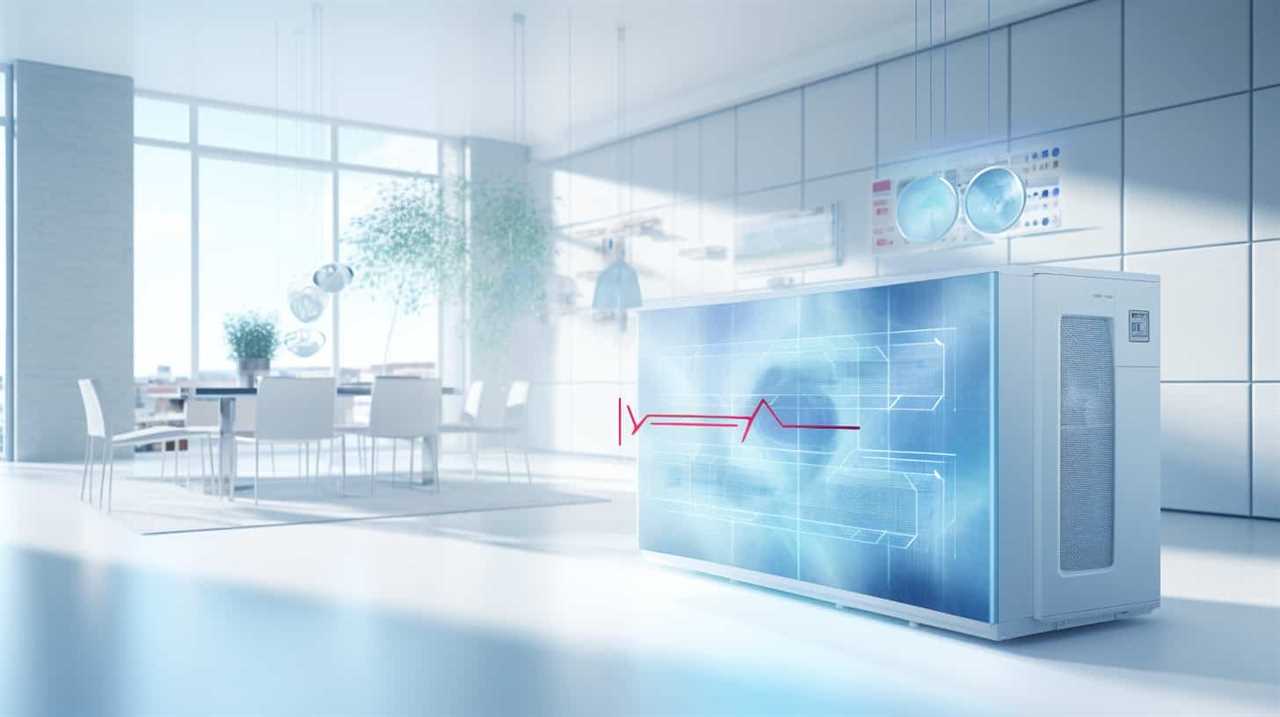
Key Takeaways
- Heat pumps provide energy-efficient home heating with higher SEER and HSPF ratings indicating more efficiency.
- Heat pumps allow for zone heating, providing personalized comfort and energy savings by only heating the rooms in use.
- Heat pumps transfer heat from one place to another using thermodynamics and key components like the compressor, condenser, evaporator, and expansion valve.
- There are different types of heat pumps for home heating, including geothermal, air source, and hybrid heat pumps, each with their own advantages.
The Basics of Heat Pump Home Heating
Let’s start by understanding the basics of heat pump home heating. Heat pump systems are innovative and efficient ways to heat your home.
One key aspect to consider is the understanding of efficiency ratings. Heat pumps have a Seasonal Energy Efficiency Ratio (SEER) and a Heating Seasonal Performance Factor (HSPF) that indicate their energy efficiency. The higher the SEER and HSPF ratings, the more efficient the heat pump. This means lower energy consumption and reduced utility bills for you.
Another benefit of heat pump home heating is the concept of zone heating. With a heat pump, you can divide your home into different zones and control the temperature independently in each area. This allows for personalized comfort and energy savings by only heating the rooms that are in use.
Understanding How Heat Pumps Work
To understand how heat pumps work, we need to know the basic principles behind their operation. Heat pump technology utilizes the principles of thermodynamics to transfer heat from one place to another. The key components of a heat pump system include the compressor, condenser, evaporator, and expansion valve.

The process begins with the evaporator, where a refrigerant absorbs heat from the surrounding air or ground. This low-temperature refrigerant is then compressed by the compressor, raising its temperature and pressure. The hot refrigerant then flows into the condenser, where it releases heat into the indoor space or water. Finally, the expansion valve reduces the pressure of the refrigerant, allowing it to return to the evaporator to repeat the cycle.
Heat pump efficiency is measured by its Coefficient of Performance (COP), which is the ratio of heat output to the electricity input. Modern heat pumps can achieve high COP values, making them an energy-efficient heating solution for homes. By harnessing the heat from the air or ground, heat pumps offer a sustainable and cost-effective way to keep our homes warm.
Types of Heat Pumps for Home Heating
There are several types of heat pumps available for home heating, and each offers its own unique advantages and disadvantages. Here are three popular types:
-
Geothermal Heat Pumps: These innovative systems extract heat from the ground and use it to warm your home. They’re highly efficient and can provide both heating and cooling. Geothermal heat pumps use the stable temperature of the earth to deliver consistent and reliable performance throughout the year.
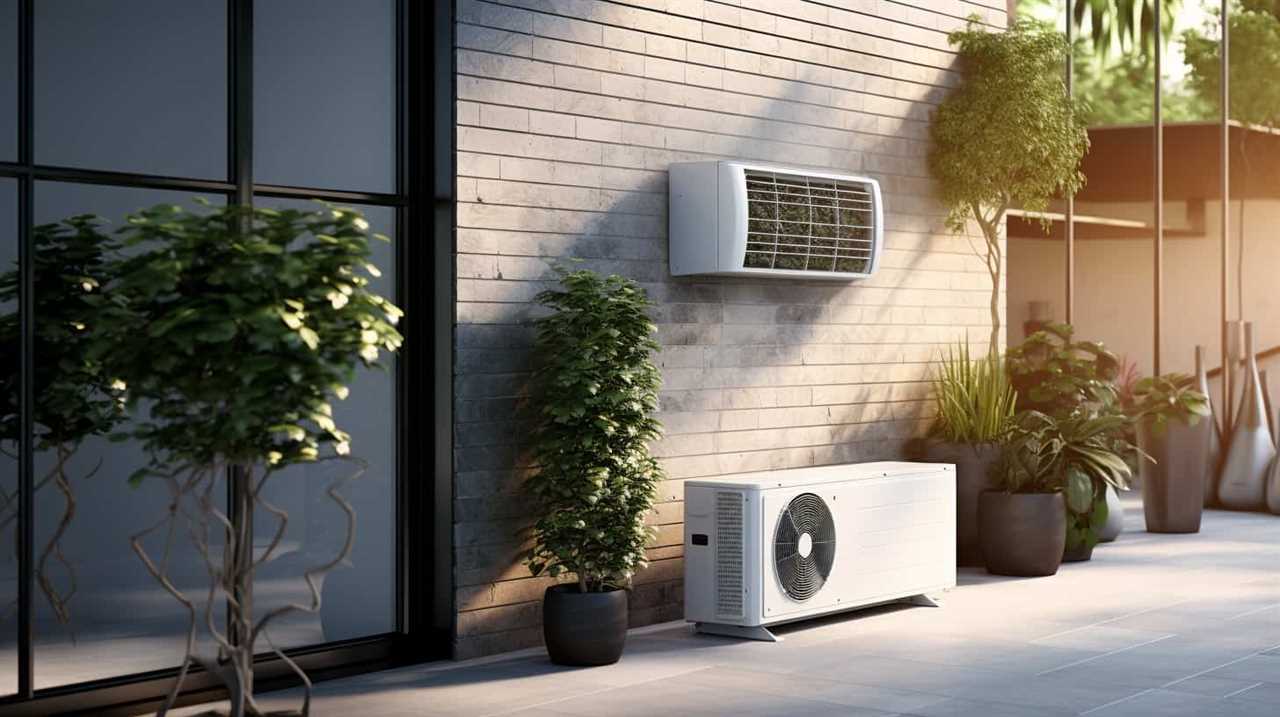
-
Air Source Heat Pumps: These heat pumps extract heat from the outdoor air and transfer it indoors to heat your home. They’re easy to install and can be a cost-effective heating solution. Air source heat pumps are versatile and can also provide cooling during hot summer months.
-
Hybrid Heat Pumps: These systems combine the benefits of both geothermal and air source heat pumps. They use geothermal energy as the primary heat source and switch to air source heat pumps during extreme temperature conditions. Hybrid heat pumps offer increased efficiency and can help lower energy costs.
When considering heat pumps for home heating, it’s important to assess your specific needs and consult with a professional to determine the best option for your home.
Factors to Consider Before Installing a Heat Pump
First, we need to evaluate our budget and energy consumption to determine if installing a heat pump is the right choice for our home. When considering the installation cost, it’s important to factor in the initial investment as well as any ongoing maintenance and operational costs. Heat pumps generally have higher upfront costs compared to traditional heating systems, but they offer long-term savings in energy consumption and utility bills.

Additionally, it’s crucial to consider the environmental impact of heat pumps. Unlike fossil fuel-based heating systems, heat pumps utilize renewable energy sources, such as the air or ground, to provide heat. This significantly reduces greenhouse gas emissions and contributes to a more sustainable future.
Sizing Your Heat Pump for Optimal Performance
When choosing a heat pump for our home, it’s essential to accurately size the unit to ensure optimal performance. Heat pump size plays a crucial role in its efficiency and effectiveness in heating our homes.
Here are three key factors to consider when sizing your heat pump:
-
Climate: The climate in which our home is located affects the heat pump size we need. In colder climates, a larger heat pump is required to meet the heating demands efficiently.

-
Insulation: The level of insulation in our home directly impacts the heat pump size needed. Well-insulated homes require smaller heat pumps, while poorly insulated ones may require larger units to compensate for heat loss.
-
Square footage: The size of our home also determines the heat pump size required. Larger homes typically need larger heat pumps to adequately heat all the living spaces.
Energy Efficiency and Cost Savings With Heat Pumps
When it comes to heat pumps, energy efficiency is a key advantage. By relying on renewable energy sources, such as the air or ground, heat pumps can lower energy bills and provide a more eco-friendly heating option.
With their ability to transfer heat rather than generate it, heat pumps can offer significant cost savings while reducing greenhouse gas emissions.

Lowering Energy Bills
Let’s dive into how heat pumps can help us cut down on our energy bills by improving energy efficiency and providing cost savings.
Here are some energy saving tips and insulation techniques that can contribute to lower energy bills:
-
Proper insulation: Ensure that your home is well-insulated to prevent heat loss and reduce the load on the heat pump.
-
Smart thermostat: Install a smart thermostat that allows you to control the temperature and schedule heating cycles, optimizing energy usage.
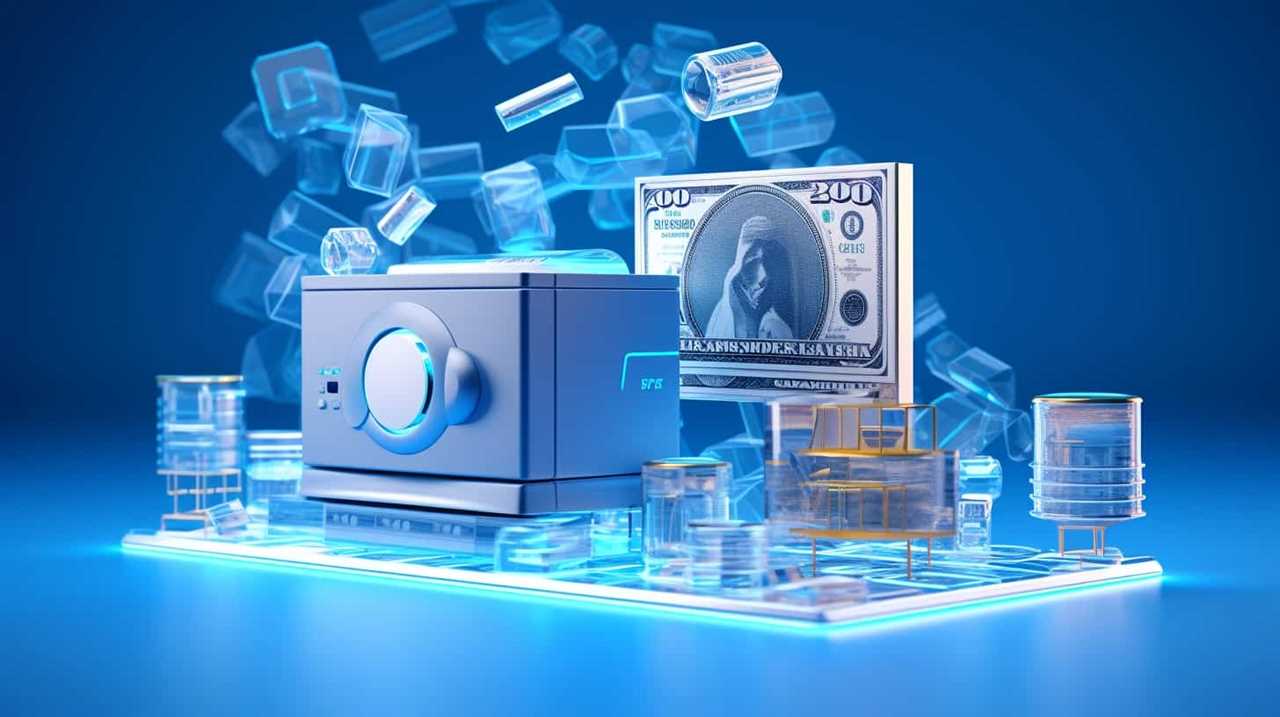
-
Regular maintenance: Keep your heat pump in top condition by scheduling regular maintenance and cleaning, ensuring optimal performance and energy efficiency.
By implementing these energy saving tips and insulation techniques, you can significantly reduce your energy consumption and save on heating costs.
Now, let’s explore an eco-friendly heating option that complements these energy-saving measures.
Eco-Friendly Heating Option
Our goal is to explore how heat pumps can be an eco-friendly heating option that offers energy efficiency and cost savings.

Heat pumps are a sustainable choice for homeowners, as they utilize renewable energy sources to generate heat. By extracting heat from the air, ground, or water, heat pumps can transfer it into your home, reducing the need for traditional fossil fuel-based heating systems. This not only reduces your carbon footprint but also helps to decrease reliance on non-renewable energy sources.
In addition to being environmentally friendly, heat pumps are highly efficient, converting a small amount of electricity into a larger amount of heat. This translates into significant cost savings on your energy bills.
Proper Maintenance and Care for Heat Pump Systems
Taking regular care of our heat pump system is essential for ensuring its optimal performance and longevity.
Proper heat pump maintenance can significantly prolong the lifespan of the system, saving homeowners from expensive repairs or replacements.
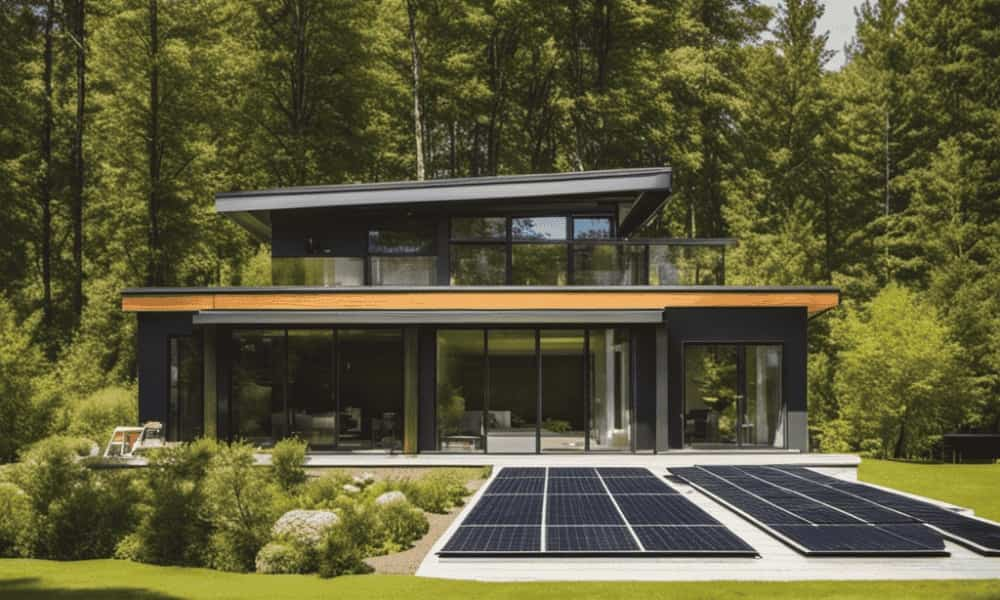
Here are three important maintenance tasks to keep your heat pump running smoothly:
-
Regular filter cleaning: Clean or replace the air filters every one to three months to prevent dust and debris buildup. Clogged filters restrict airflow and reduce system efficiency.
-
Coil cleaning: Clean the outdoor and indoor coils annually to remove dirt and debris. Dirty coils hinder heat transfer and can lead to system breakdowns.
-
Professional inspections: Schedule annual maintenance checks by a qualified technician to identify and address any potential issues early on. They’ll inspect the system, check refrigerant levels, inspect electrical connections, and ensure all components are functioning properly.
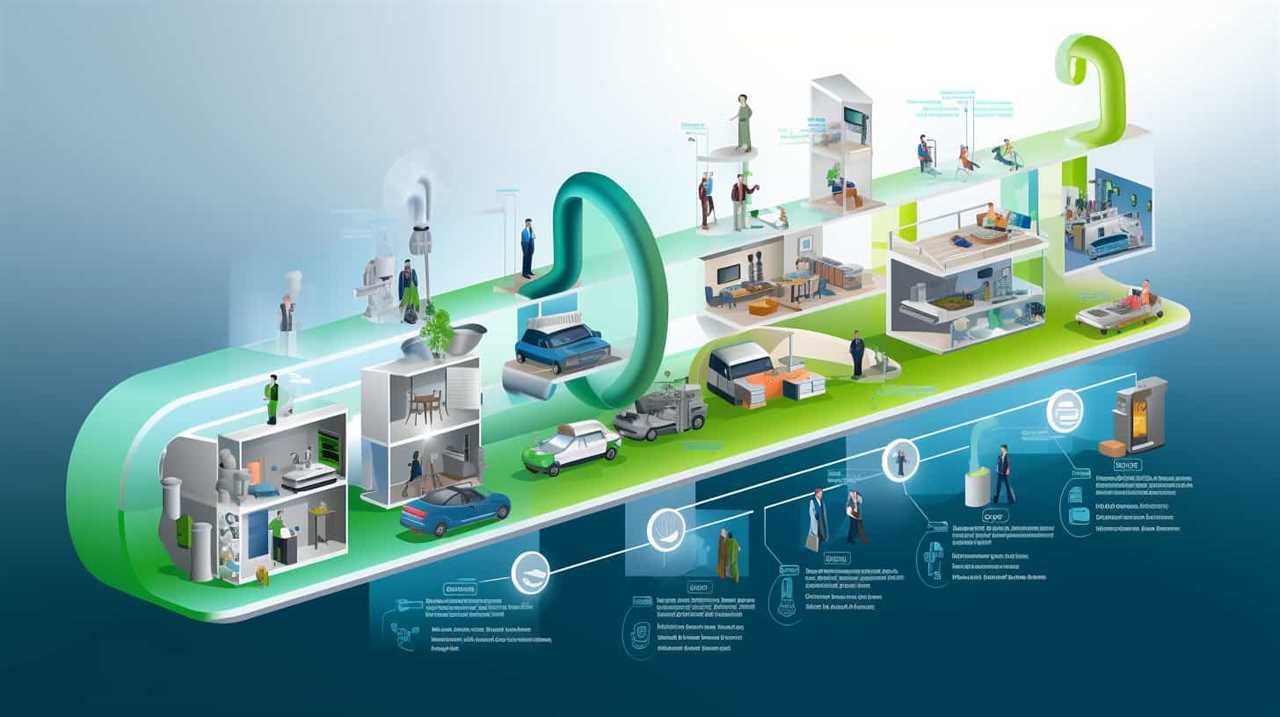
Supplemental Heating Options for Cold Climates
We have several supplemental heating options available for cold climates, including electric space heaters and wood-burning stoves. However, for those seeking innovative and efficient solutions, geothermal heating and radiant floor heating are excellent choices. Geothermal heating utilizes the earth’s natural heat to provide consistent warmth throughout the home. By tapping into the stable temperature underground, this system offers high energy efficiency and reduces greenhouse gas emissions. Radiant floor heating, on the other hand, involves installing a network of pipes beneath the floor to distribute heat evenly. This method provides maximum comfort as the heat rises from the floor, eliminating cold spots and drafts. Both geothermal heating and radiant floor heating are sustainable, cost-effective, and offer a higher level of control over indoor temperature.
| Geothermal Heating | Radiant Floor Heating | |
|---|---|---|
| Energy Efficiency | High | High |
| Environmental Impact | Low | Low |
| Comfort | Consistent warmth | Even heat distribution |
| Cost | Initial investment, long-term savings | Initial investment, long-term savings |
Common Issues and Troubleshooting Tips for Heat Pumps
We have encountered several common issues with heat pumps and have compiled some troubleshooting tips to help you resolve them. Here are three common problems and their troubleshooting techniques:
-
Insufficient heating or cooling: If your heat pump isn’t providing enough warmth or coolness, check the air filters for clogs and clean or replace them if necessary. Ensure that the thermostat is set correctly and that there are no obstructions around the outdoor unit. Also, make sure that the heat pump isn’t in defrost mode, as this can temporarily reduce heating capacity.
-
Frozen coils: If you notice ice or frost on the outdoor unit, it could be due to a refrigerant leak, a dirty air filter, or blocked airflow. Check for any visible leaks and contact a professional if necessary. Clean or replace the air filter and remove any debris obstructing the unit. Additionally, ensure that the outdoor unit isn’t covered or surrounded by snow or ice.

-
Unusual noises: If your heat pump is making strange noises such as grinding, rattling, or squealing, it could indicate a problem. Check for loose or damaged components, such as fan blades or motor mounts, and tighten or replace them as needed. If the noise persists, contact a professional technician to further diagnose the issue.
Upgrading Your Home’s Heating System to a Heat Pump
To upgrade your home’s heating system to a heat pump, consider consulting with a professional HVAC technician for guidance and installation. The installation process of a heat pump involves several important steps that require professional assistance.
First, the technician will assess your home’s heating needs and determine the appropriate size and type of heat pump for your space. They’ll then carefully install the heat pump, ensuring that it’s properly connected to your existing ductwork or installing new ducts if necessary.
The technician will also set up the thermostat and ensure that the heat pump is calibrated correctly. Throughout the installation process, the technician will follow industry best practices and safety guidelines to ensure a smooth and efficient transition to your new heating system.
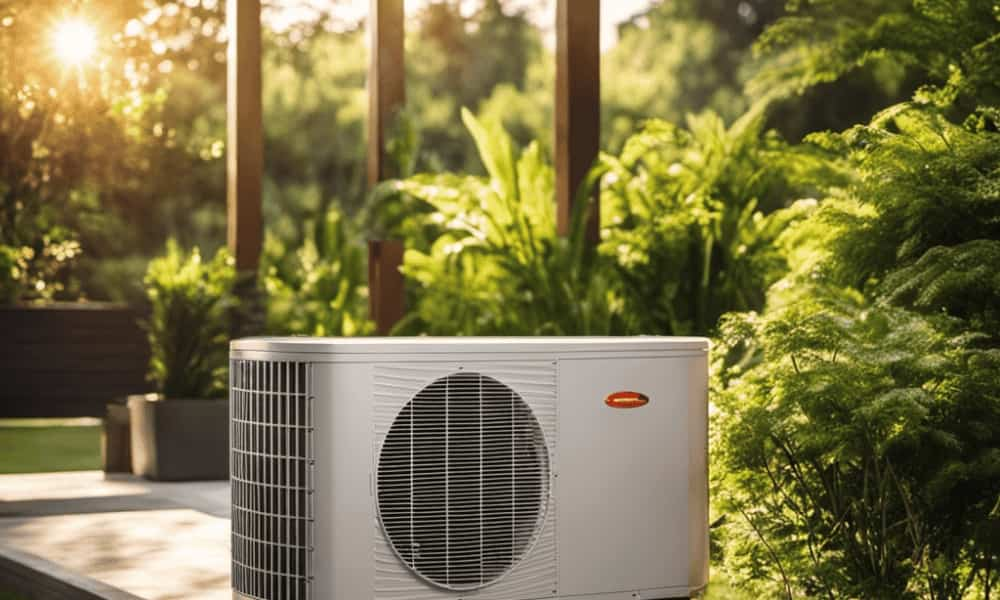
Once the installation is complete, you can enjoy the benefits of your upgraded heat pump.
In the next section, we’ll explore rebates and incentives available for heat pump installation, which can help offset the cost of the upgrade and increase your savings.
Exploring Rebates and Incentives for Heat Pump Installation
When it comes to installing a heat pump, there are significant financial benefits to consider. One of the main advantages is the availability of rebates and incentives that can help offset the initial costs. These rebates can come from various sources, such as government programs, utility companies, or even manufacturers themselves.
However, it’s important to note that eligibility requirements may vary, so it’s essential to research and understand the specific criteria for each rebate or incentive program.
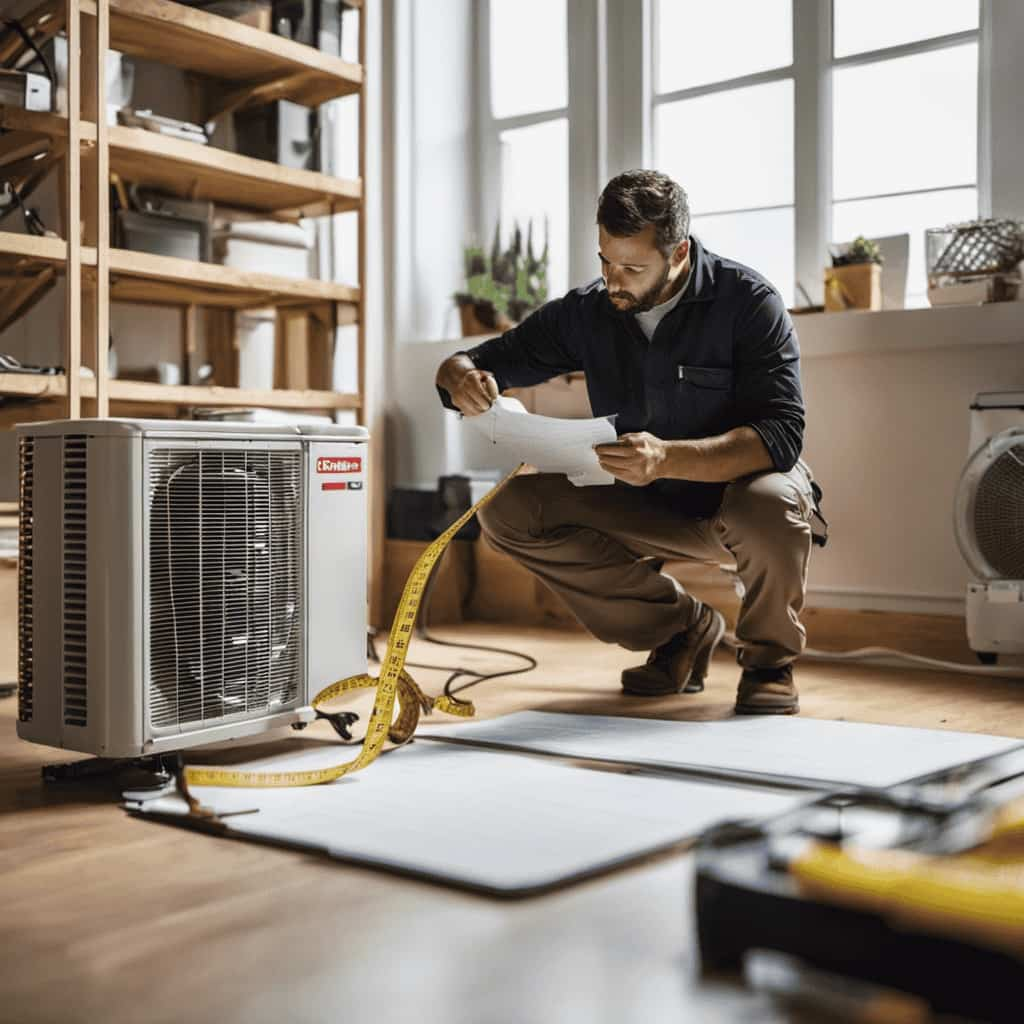
Financial Benefits of Rebates
Taking advantage of available rebates and incentives can greatly enhance the financial benefits of heat pump installation. When considering the financial savings of heat pump home heating, it’s important to explore the various government incentives that are available. These incentives are designed to encourage homeowners to adopt more energy-efficient technologies, such as heat pumps, and can help offset the initial cost of installation.
Here are three key benefits of rebates and incentives:
-
Reduced upfront costs: Many government programs offer rebates that can significantly reduce the initial cost of purchasing and installing a heat pump. This can make it more affordable for homeowners to make the switch to this energy-efficient heating option.
-
Lower operating costs: Heat pumps are known for their energy efficiency, which means they can help homeowners save on their monthly utility bills. Additionally, some government incentives provide ongoing financial benefits, such as tax credits or lower electricity rates, which can further contribute to long-term cost savings.
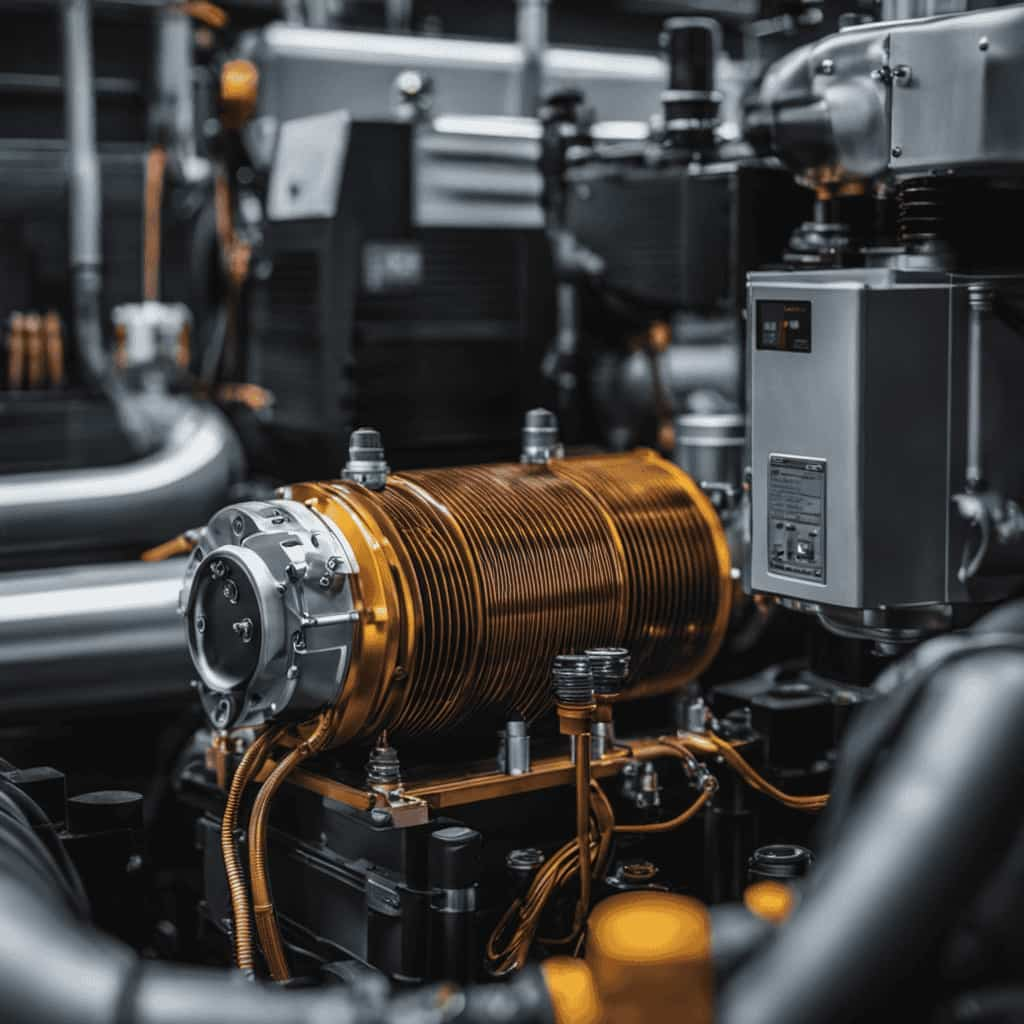
-
Environmental benefits: By choosing a heat pump and taking advantage of available incentives, homeowners can contribute to reducing greenhouse gas emissions and promoting a cleaner, more sustainable future. This not only benefits the environment but also helps create a healthier living space for individuals and communities.
Eligibility for Incentives
We can explore the eligibility requirements and available incentives for heat pump installation. Incentive programs and government subsidies are an excellent way to offset the cost of installing a heat pump in your home. These programs aim to encourage homeowners to adopt energy-efficient heating systems by offering financial incentives. To help you understand the eligibility requirements and available incentives, we have provided a table below:
| Program Name | Eligibility Criteria | Incentives Available |
|---|---|---|
| Program A | Must be a homeowner | Up to $1,000 rebate on heat pump purchase |
| Program B | Must meet income requirements | 50% subsidy on installation costs |
| Program C | Must replace an existing inefficient heating system | 30% tax credit on heat pump installation |
Frequently Asked Questions
Are Heat Pumps Suitable for All Types of Homes?
Yes, heat pumps are suitable for all types of homes. They are cost-effective options that provide energy efficiency. Heat pumps can efficiently heat and cool homes, making them a versatile and innovative choice for homeowners.
Can a Heat Pump Be Used for Both Heating and Cooling?
Yes, a heat pump can be used for both heating and cooling. It efficiently transfers heat from one place to another, providing the benefits of energy savings and year-round comfort in our homes.
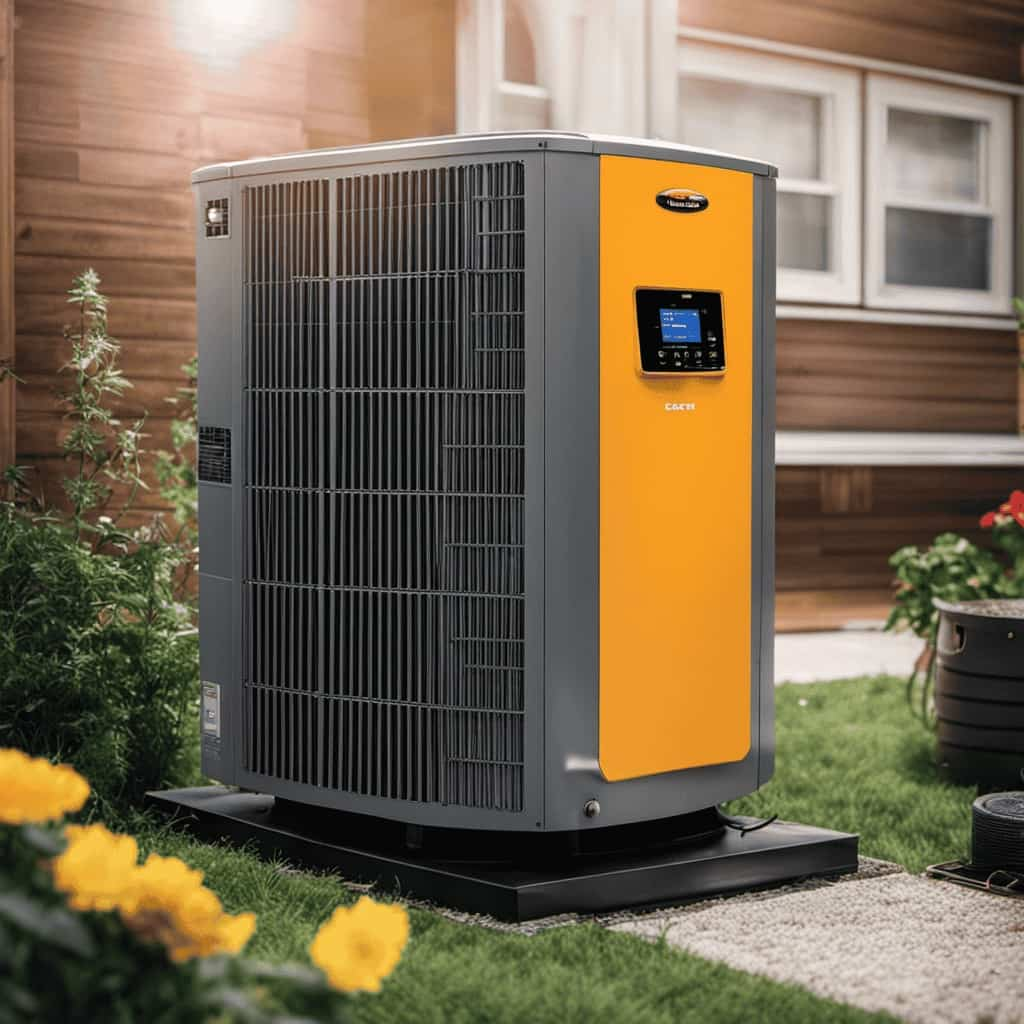
How Long Does a Heat Pump Typically Last?
A heat pump typically lasts around 15 to 20 years. Regular heat pump maintenance, such as changing filters and inspecting for signs of a failing heat pump, can help prolong its lifespan.
Are Heat Pumps Noisy?
Are heat pumps noisy? Yes, they can produce some noise, but advancements in technology have led to quieter operation. To further reduce noise, consider proper installation, regular maintenance, and selecting models with low noise levels.
What Is the Average Cost of Installing a Heat Pump in a Home?
The average cost of installing a heat pump in a home can vary depending on factors such as size, type, and location. However, it is important to consider the long-term cost comparison and energy efficiency benefits of heat pumps.
Conclusion
In conclusion, heat pump home heating offers an efficient and eco-friendly solution for keeping your home warm.

By understanding how heat pumps work and choosing the right type and size for your home, you can optimize their performance.
Additionally, considering supplemental heating options for colder climates and being aware of common issues and troubleshooting tips will ensure a smooth heating experience.
Upgrade your heating system to a heat pump and explore the rebates and incentives available for a cost-effective and sustainable solution.
Home Heating Solutions
Why Your Heating Bill Bites: Affordable Heat Pump Solutions

Discover why your heating bill is high and explore cost-effective heat pump options that can help you reduce the strain of expensive heating costs.
We, as homeowners seeking savings, can benefit from heat pumps, efficient devices that slash energy bills.
In this article, we explore various heat pump types, highlight the advantages of investing in affordable solutions, and provide tips for choosing, installing, and maintaining these systems.
Discover financial incentives and debunk common misconceptions, while being inspired by real-life success stories.
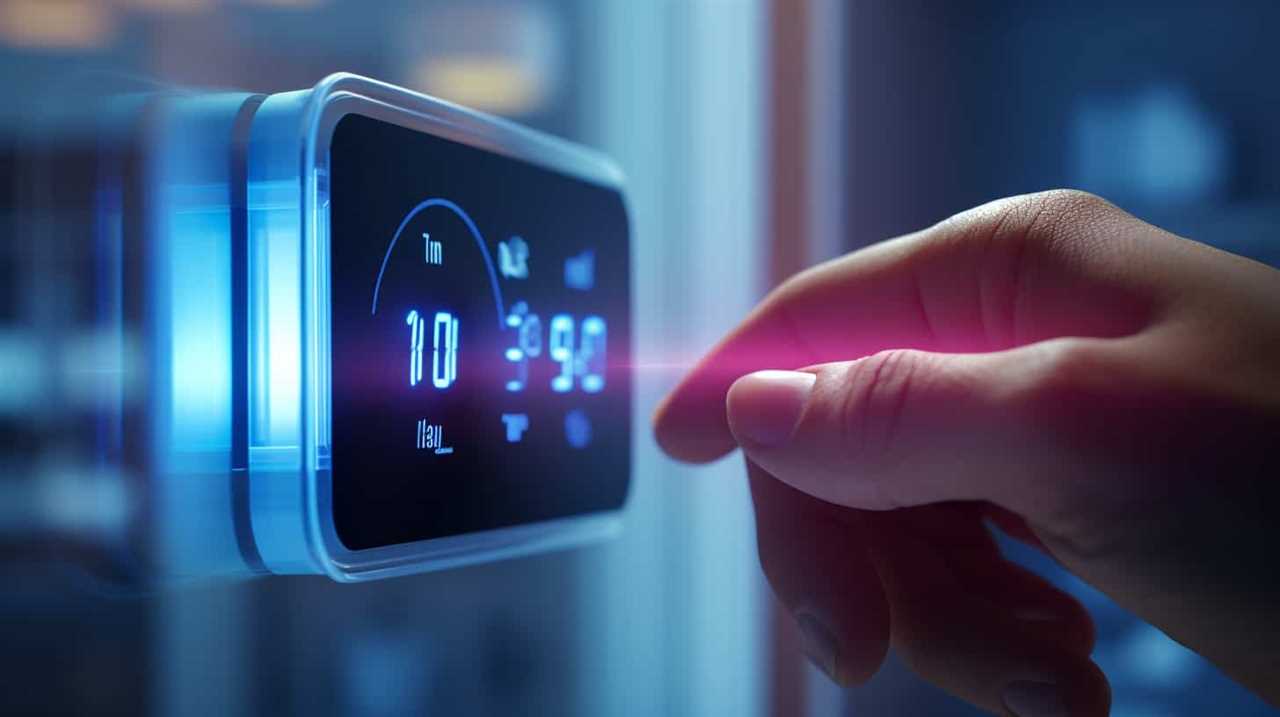
Join us on this journey to transform your heating bills.
Key Takeaways
- Affordable heat pump solutions offer lower energy consumption and reduced utility bills
- Heat pumps are highly efficient compared to traditional systems
- Heat pumps can both heat and cool homes, eliminating the need for separate systems
- Heat pump installation leads to significant energy savings and reduced carbon footprint
The Rising Cost of Heating: Understanding the Problem
We need to understand the rising cost of heating in order to find solutions.
Energy consumption plays a significant role in our heating expenses. By analyzing our energy usage patterns, we can identify areas where we can reduce consumption and save money.
It’s crucial to be aware of the impact our heating systems have on the environment. Traditional heating methods, such as fossil fuel-based systems, contribute to greenhouse gas emissions, further exacerbating climate change. Understanding the environmental consequences of our energy consumption can motivate us to explore more sustainable alternatives.

By adopting energy-efficient technologies like heat pumps, we can significantly reduce both our heating costs and our carbon footprint. Heat pumps utilize renewable energy sources and can provide heating, cooling, and hot water efficiently.
Embracing these solutions will enable us to address the rising cost of heating while also benefiting the environment.
How Heat Pumps Can Save You Money on Energy Bills
By installing a heat pump, you can save money on your energy bills while enjoying efficient heating and cooling. Here are three ways heat pumps can help you save:
-
Energy Efficiency: Heat pumps are highly efficient compared to traditional heating and cooling systems. They work by transferring heat from the air or ground into your home, rather than generating heat. This means they use less energy to provide the same level of comfort.

-
Dual Functionality: Heat pumps can both heat and cool your home, eliminating the need for separate systems. This reduces installation and maintenance costs, as well as energy consumption.
-
Energy Saving Tips: To maximize energy savings with your heat pump, consider the following tips: set your thermostat to an energy-efficient temperature, seal any air leaks in your home, and regularly maintain your heat pump system.
Investing in a heat pump installation can lead to significant energy savings, helping you reduce your carbon footprint while keeping your home comfortable.
Exploring the Different Types of Heat Pumps
There are three main types of heat pumps: air source heat pumps, ground source heat pumps, and water source heat pumps. Each type utilizes different heat pump technology to transfer heat from one place to another.
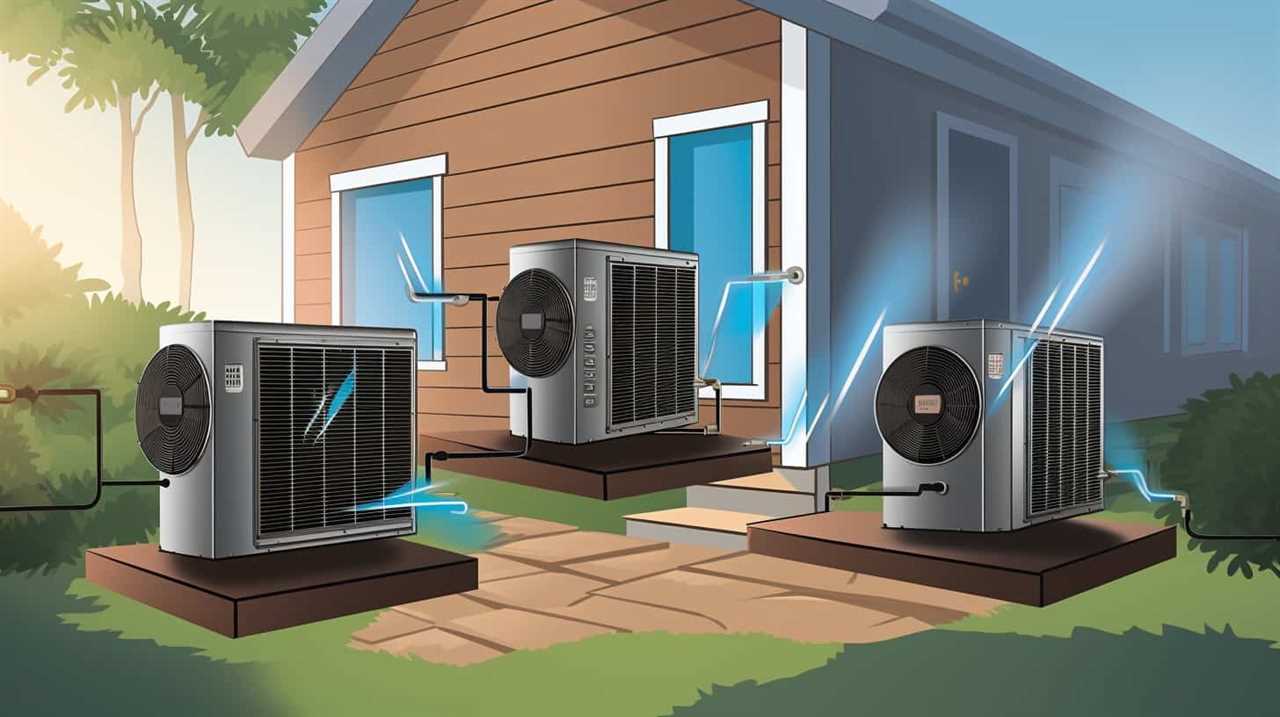
Air source heat pumps extract heat from the outside air and transfer it inside, while ground source heat pumps use heat from the ground through a series of pipes buried underground. Water source heat pumps, on the other hand, extract heat from a water source such as a lake or pond.
When comparing heat pump efficiency, ground source heat pumps tend to be the most efficient, followed by water source heat pumps, and then air source heat pumps.
It’s important to consider the specific needs and circumstances of your home when choosing the right type of heat pump for optimal energy savings.
Benefits of Investing in an Affordable Heat Pump Solution
Investing in an affordable heat pump solution offers several benefits that can make a significant impact on your energy costs and home comfort.
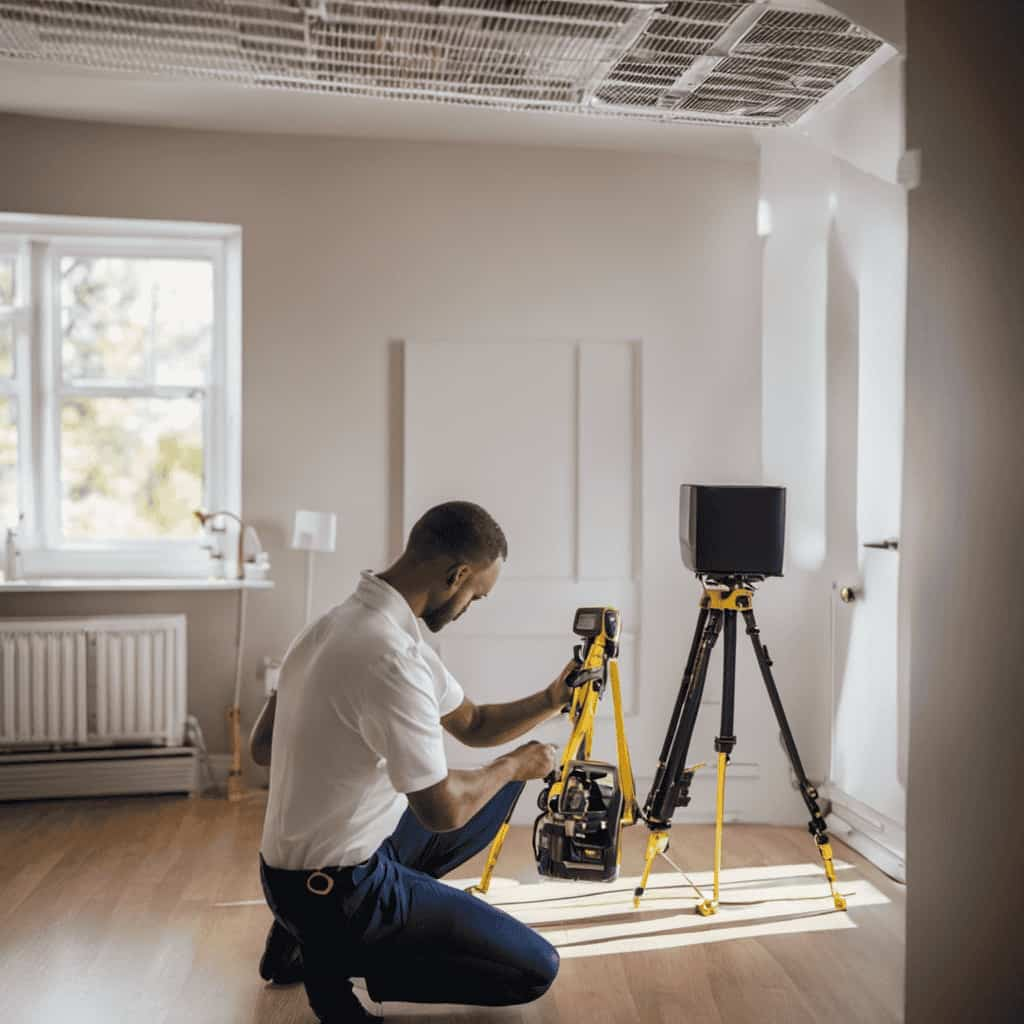
By utilizing the latest technology, these heat pumps are designed to efficiently heat and cool your home, resulting in lower energy consumption and reduced utility bills.
Additionally, these solutions provide consistent and even heating throughout your home, eliminating hot and cold spots and ensuring a more comfortable living environment.
Lower Energy Costs
Using an affordable heat pump solution can significantly reduce our energy costs. Here are three ways in which investing in an affordable heat pump can help lower our energy bills:
-
Increased energy efficiency: Heat pumps are known for their high efficiency, as they transfer heat from the air or ground to heat our homes. This means that they require less energy to produce the same amount of heat compared to traditional heating systems.

-
Reduced reliance on fossil fuels: Heat pumps run on electricity, which is often generated from renewable sources such as solar or wind. By using a heat pump, we can reduce our reliance on fossil fuels and decrease our carbon footprint.
-
Smart energy management: Heat pumps come with advanced features such as programmable thermostats and smart controls, allowing us to optimize our energy consumption. By using these energy-saving tips, we can further reduce our energy costs and lessen our environmental impact.
Investing in an affordable heat pump solution not only helps us save money but also contributes to a greener and more sustainable future.
Increased Home Comfort
An affordable heat pump solution can greatly improve our home comfort by providing efficient and consistent heating throughout the year. Not only does it help us save on energy costs, but it also enhances our indoor air quality.
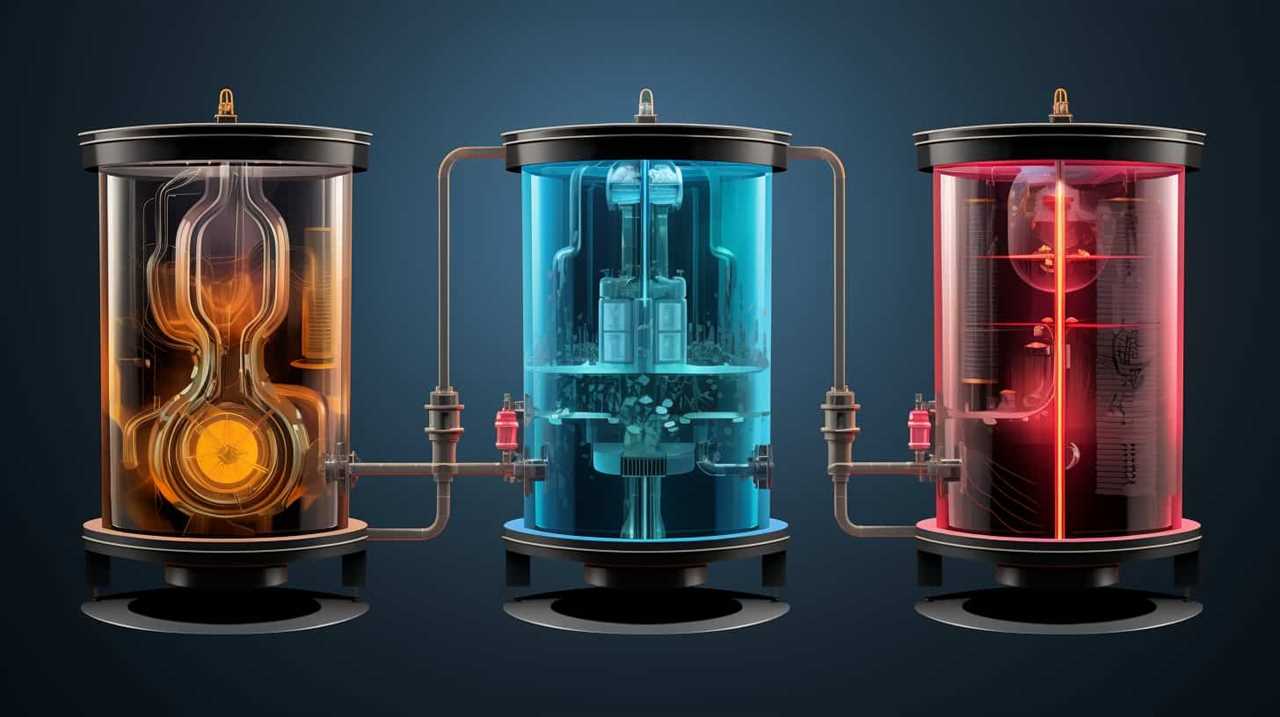
With a heat pump, we can enjoy increased energy savings due to its high efficiency. Heat pumps transfer heat rather than generate it, making them more efficient than traditional heating systems. This means that we can stay warm and comfortable without breaking the bank.
Additionally, heat pumps have the added benefit of improving indoor air quality. They filter and circulate the air, removing allergens, dust, and other pollutants, creating a healthier living environment for our families.
Investing in an affordable heat pump solution is a practical choice that brings both comfort and savings to our homes.
Factors to Consider When Choosing a Heat Pump for Your Home
When considering a heat pump for our home, we should take into account various factors to ensure we make the right choice. Here are three key factors to consider:
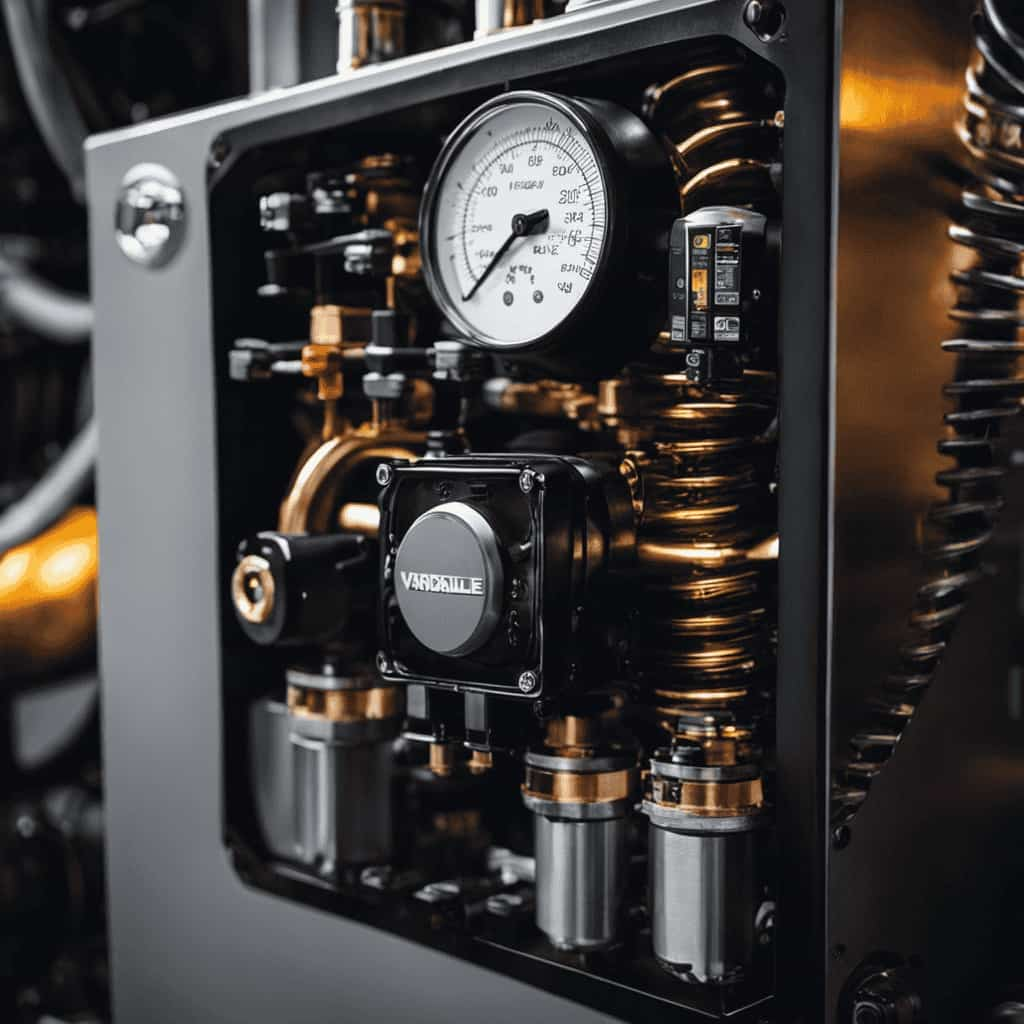
-
Heat pump efficiency: Efficiency is an important consideration when choosing a heat pump. Look for a model with a high SEER (Seasonal Energy Efficiency Ratio) rating for cooling and a high HSPF (Heating Seasonal Performance Factor) rating for heating. A more efficient heat pump will save you money on energy bills in the long run.
-
Choosing the right size heat pump: It’s crucial to select a heat pump that’s the right size for your home. An undersized heat pump will struggle to heat or cool your home effectively, while an oversized one will cycle on and off frequently, leading to energy wastage and temperature fluctuations. Consult with a professional to determine the appropriate size for your specific needs.
-
Additional features and warranties: Consider the additional features and warranties offered by different heat pump models. Look for features like programmable thermostats, variable-speed motors, and noise reduction technology. Also, ensure that the manufacturer provides a reliable warranty to protect your investment.
Installation and Maintenance Tips for Heat Pump Efficiency
To ensure the efficiency of a heat pump, there are three key points to consider: proper filter maintenance, regular professional check-ups, and optimal thermostat settings.
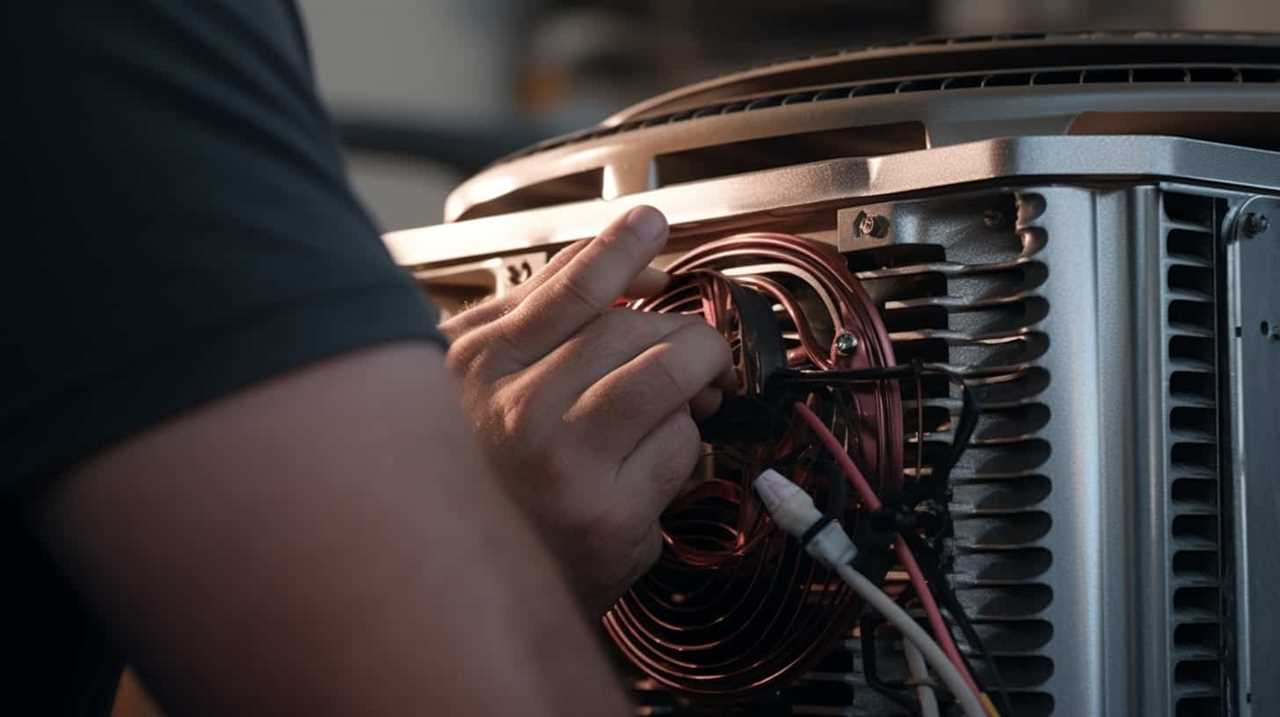
By regularly cleaning or replacing the filters, the heat pump can operate at its best, preventing dirt and debris from obstructing airflow.
Additionally, scheduling professional maintenance check-ups allows for early detection of any potential issues, ensuring the system runs smoothly.
Lastly, setting the thermostat to the optimal temperature helps maximize energy efficiency and reduce heating costs.
Proper Filter Maintenance
The key to maintaining heat pump efficiency is regularly replacing the filter. Proper maintenance of the filter is crucial for the overall performance and longevity of the heat pump system. Here are three important tips to consider:
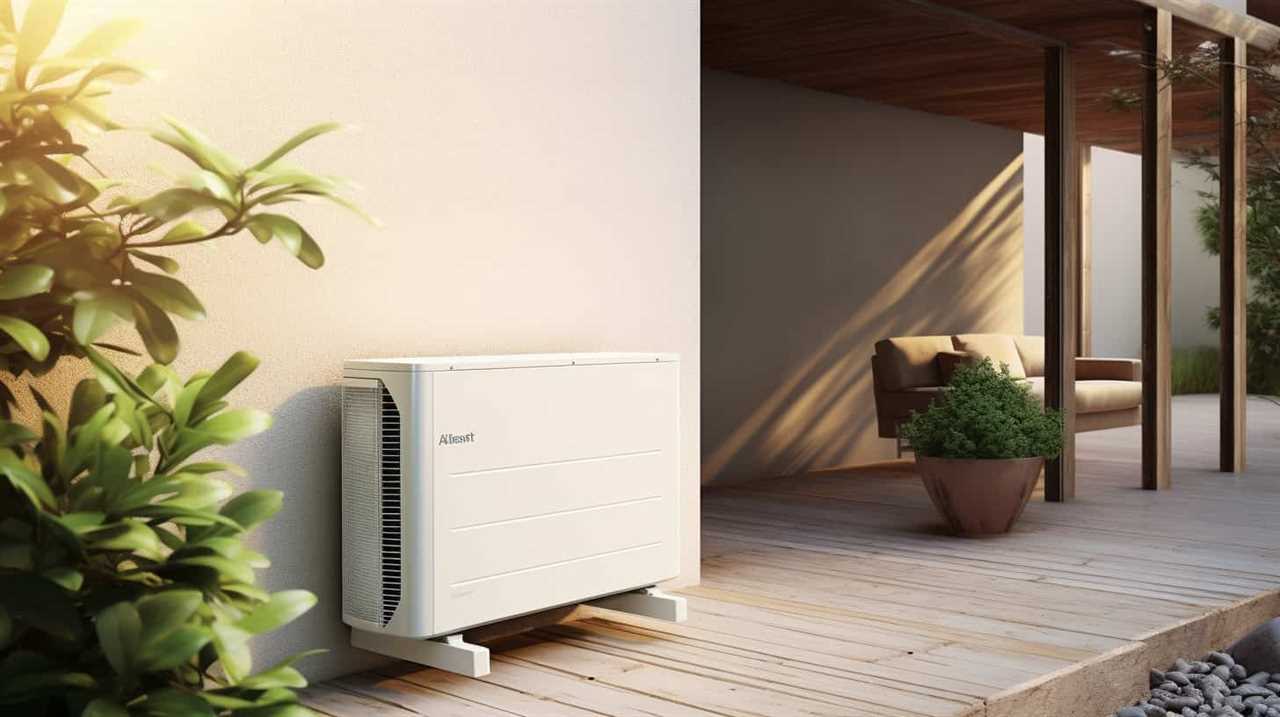
-
Choose a high-quality filter: Investing in a filter of good quality ensures that it effectively captures dust, allergens, and other airborne particles. Look for filters with a high MERV (Minimum Efficiency Reporting Value) rating for optimal filtration.
-
Follow the manufacturer’s guidelines: Each heat pump system comes with specific recommendations for filter replacement. It’s essential to follow these guidelines and replace the filter at the suggested intervals to maintain optimal airflow and prevent strain on the system.
-
Regularly clean or replace the filter: Depending on the environment and usage, filters may need cleaning or replacement every one to three months. Regular maintenance of the filter helps improve indoor air quality and ensures the heat pump operates efficiently.
Regular Professional Check-Ups
To ensure optimal performance and efficiency, we recommend scheduling regular professional check-ups and maintenance for your heat pump system. Regular maintenance by HVAC professionals is essential to keeping your heat pump running smoothly and avoiding any potential issues. These check-ups allow the professionals to inspect and clean the various components of your heat pump, ensuring that they are functioning properly. They can also identify any potential problems early on and take necessary measures to prevent them from becoming major issues. By investing in regular maintenance, you can extend the lifespan of your heat pump and improve its overall efficiency, saving you money in the long run. So, don’t overlook the importance of regular professional check-ups for your heat pump system.

| Benefits of Regular Professional Check-ups |
|---|
| Identifies potential issues early on |
| Extends the lifespan of your heat pump |
| Improves overall efficiency |
| Saves money in the long run |
| Ensures optimal performance |
Optimal Thermostat Settings
Our recommended thermostat settings are crucial for maximizing heat pump efficiency. By properly programming your thermostat, you can achieve significant energy savings.
Here are three tips to help you optimize your thermostat settings:
-
Set a comfortable yet energy-efficient temperature: Keep your thermostat set to the lowest temperature that’s comfortable for you and your family. Lowering the temperature by just a few degrees can result in substantial energy savings.
-
Utilize programmable settings: Take advantage of the programmable features on your thermostat. Set different temperatures for different times of the day to align with your schedule. For example, lower the temperature when you’re away from home and increase it before you return.
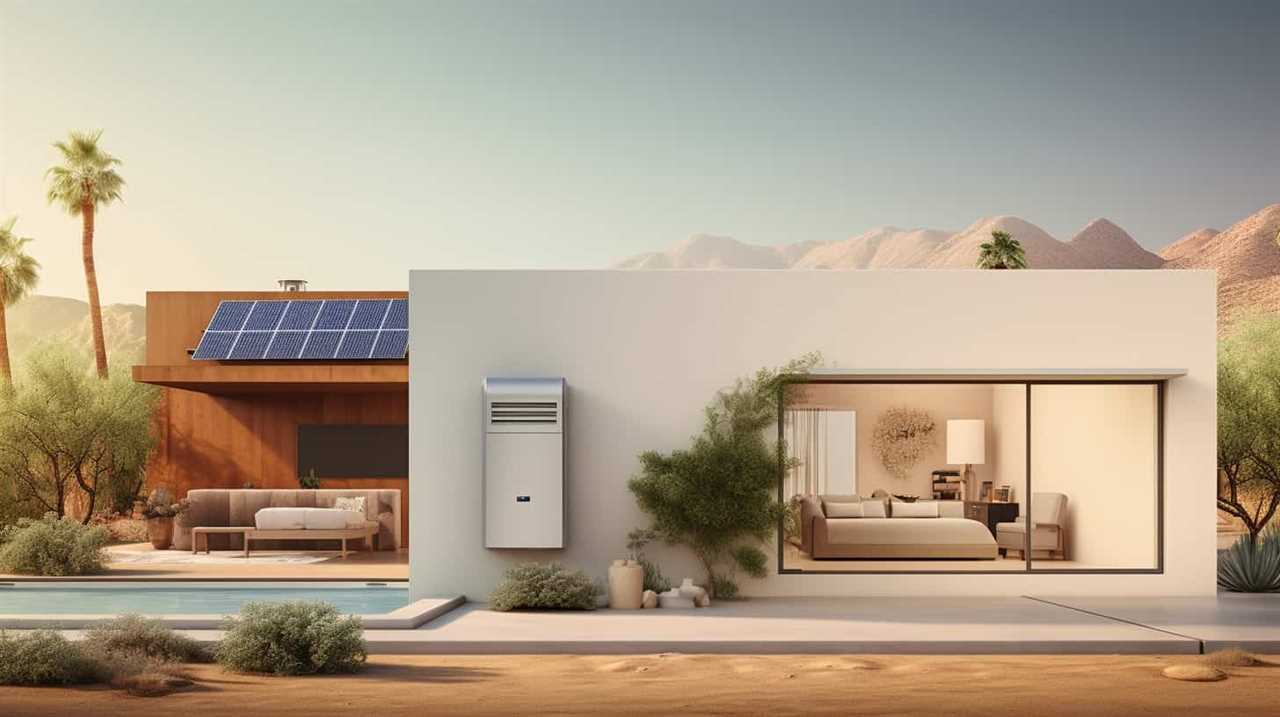
-
Regularly maintain and calibrate your thermostat: Ensure that your thermostat is functioning properly by regularly checking and calibrating it. A well-maintained and accurate thermostat will provide more precise temperature control and optimize energy usage.
Financial Incentives and Rebates for Heat Pump Upgrades
We can take advantage of various financial incentives and rebates when upgrading our heat pumps. These incentives are designed to encourage homeowners to invest in energy-efficient heating systems and reduce their energy consumption.
By upgrading to a high-efficiency heat pump, we can’t only save on our heating bills but also contribute to a greener environment. Many utility companies and government agencies offer financial incentives in the form of rebates or tax credits for the installation of energy-efficient heat pumps. These incentives can significantly offset the initial cost of the upgrade and provide long-term energy savings.
Additionally, some programs offer low-interest loans or financing options to further assist homeowners in making the switch to a more efficient heating system. It’s important to research and take advantage of these financial incentives to maximize the energy savings and reduce our heating costs.

Common Misconceptions About Heat Pumps Debunked
Many homeowners have misconceptions about heat pumps, but understanding their benefits and how they work can help us make informed decisions for our heating needs. Here are some common misconceptions about heat pumps debunked:
-
Heat pumps are only effective in warm climates: Contrary to popular belief, heat pumps can provide efficient heating even in cold climates. They can extract heat from the air, ground, or water and transfer it indoors, making them suitable for various regions.
-
Heat pumps are expensive to install: While the initial cost of installing a heat pump may be higher compared to traditional heating systems, the long-term savings from lower energy bills can offset this cost. Additionally, there are often financial incentives and rebates available that can help reduce the upfront expense.
-
Heat pumps only provide heating: Heat pumps are versatile and can provide both heating and cooling. They can also dehumidify the air, improving indoor air quality and comfort.
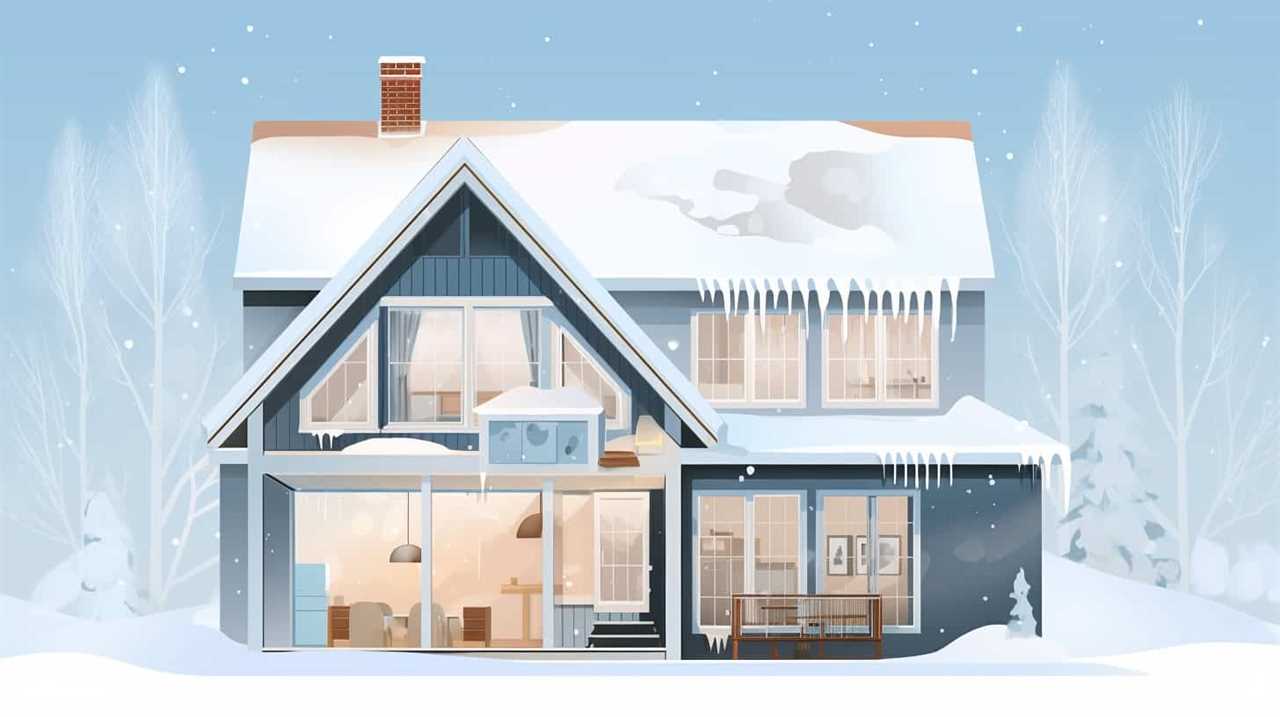
Real-Life Success Stories: How Heat Pump Solutions Transformed Heating Bills
With heat pump solutions, we saw a remarkable transformation in our heating bills. Real-life testimonials show how these cost-saving strategies can make a significant impact on household expenses.
Take, for example, the case of the Johnson family. Before installing a heat pump, their monthly heating bill averaged $200 during the winter months. However, after switching to a heat pump system, their bills dropped to an average of $100. This resulted in annual savings of $1,200, allowing the Johnsons to allocate those funds towards other household needs.
Another success story comes from the Rodriguez family, who saw an even more significant reduction in their heating costs. Prior to installing a heat pump solution, their monthly bill skyrocketed to $300. With the new system in place, their bills were cut in half, resulting in yearly savings of $2,400.
These real-life success stories highlight the effectiveness of heat pump solutions in transforming heating bills and providing cost-saving benefits for households.

Frequently Asked Questions
What Is the Average Lifespan of a Heat Pump?
On average, the lifespan of a heat pump is around 15-20 years. However, this can vary depending on factors such as maintenance requirements and usage patterns. Regular maintenance can help prolong the life of a heat pump.
Can a Heat Pump Be Used for Both Heating and Cooling?
Yes, a heat pump can be used for both heating and cooling. This is one of the benefits of dual heat pump systems. They offer high heat pump efficiency and can help reduce energy costs.
Are Heat Pumps Noisy When in Operation?
Heat pump installation requires consideration of noise reduction techniques. While heat pumps can generate some noise during operation, proper installation, sound barriers, and regular maintenance can significantly reduce the noise levels for a more comfortable living environment.
How Much Space Is Required for the Installation of a Heat Pump?
To install a heat pump, you’ll need adequate space. The requirements vary depending on the type and size of the unit. It’s important to consider factors like clearance, accessibility, and proper ventilation for optimal performance.
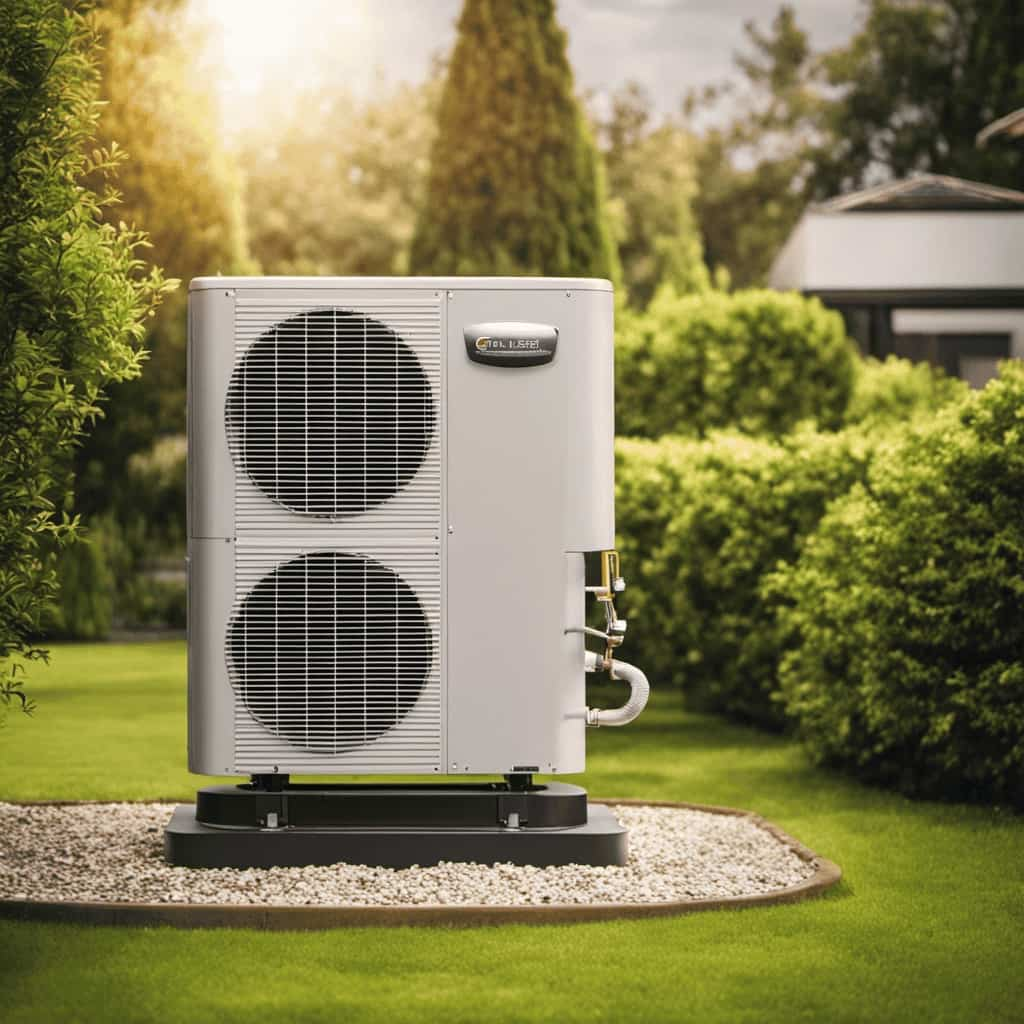
Are There Any Potential Health Concerns Associated With Using a Heat Pump?
Potential health risks and environmental impact are important considerations when using a heat pump. We need to evaluate the impact on air quality and noise levels, as well as the potential for allergic reactions or respiratory issues.
Conclusion
In conclusion, investing in an affordable heat pump solution can significantly reduce your heating bill and save you money in the long run.
According to a recent study, homeowners who switched to heat pumps saw an average decrease of 30% in their energy bills. This statistic highlights the effectiveness of heat pumps in improving energy efficiency and reducing costs.
By considering the different types of heat pumps and taking advantage of financial incentives, homeowners can make a smart choice to lower their heating expenses.

Home Heating Solutions
Updated Guide: Top Heat Pumps for Cold Climates

Our team has compiled the latest research on heat pumps specifically engineered for cold climates, and the results are impressive. With advanced features tailored for cold weather conditions, these high-capacity, energy-efficient heat pumps are built to withstand harsh cold temperatures and extreme winter conditions.
Not only are they durable and reliable, but they also operate quietly and efficiently. Plus, they offer superior heating performance in chilly environments.
Get ready to stay warm and save money with our updated guide to the top heat pumps for cold climates.
Key Takeaways
- Heat pumps designed for cold climates have features such as frost-resistant technology, enhanced performance in extreme cold, and robust construction for durability.
- Quiet and reliable operation is an important factor to consider when choosing a heat pump for cold climates, with built-in soundproofing features and compliance with local noise regulations.
- Energy-saving features of heat pumps in cold temperatures include variable speed compressors and smart defrost systems, which adjust speed and capacity according to heating demands, resulting in energy savings and improved performance.
- Cost-effective heat pumps for cold climates should have smart home integration for remote control, real-time monitoring and alerts, lower energy consumption and carbon footprint, and a high coefficient of performance (COP) for energy efficiency.
Energy-Efficient Heat Pumps for Cold Weather
We’ve found three energy-efficient heat pumps that work well in cold weather. These energy-saving heat pumps are designed to withstand low temperatures and provide efficient heating for homes and buildings in frost-prone areas.

The first heat pump on our list is the FrostMaster 5000. With its advanced frost-resistant technology, it can maintain optimal performance even in extreme cold conditions.
The second option is the ArcticBreeze X3, which boasts a high coefficient of performance, ensuring maximum energy efficiency.
Lastly, we’ve the PolarHeat Pro, known for its exceptional heating capacity and low energy consumption.
These heat pumps not only save energy but also provide reliable and consistent heating, making them ideal choices for those living in cold climates.

High-Capacity Heat Pumps for Extreme Cold
Our top picks for high-capacity heat pumps in extreme cold are the ArcticMax 9000 and the PolarForce 7000. These energy-efficient heat pumps are specifically designed to withstand freezing conditions and provide reliable heating even in the harshest winters.
Here are four reasons why these high-capacity heat pumps are ideal for extreme temperatures:
-
Enhanced Performance: The ArcticMax 9000 and PolarForce 7000 are equipped with advanced technologies that optimize performance in extreme cold, ensuring efficient heat transfer and maximum comfort in your home.
-
Robust Construction: These heat pumps are built with durable materials and components that can withstand extreme temperatures, ensuring long-lasting performance and reliability.

-
Intelligent Defrosting: Both models feature intelligent defrosting systems that minimize energy consumption and prevent ice buildup, allowing for continuous operation even in sub-zero temperatures.
-
High Heating Capacity: With their high-capacity design, the ArcticMax 9000 and PolarForce 7000 can deliver powerful heating outputs, making them suitable for large spaces or homes in regions with extreme cold climates.
When it comes to high-capacity heat pumps for extreme temperatures, the ArcticMax 9000 and PolarForce 7000 are exceptional choices that prioritize energy efficiency and reliable performance in freezing conditions.
Durable Heat Pumps for Harsh Winter Conditions
For harsh winter conditions, we recommend durable heat pumps that can withstand extreme temperatures and provide reliable heating. When it comes to energy efficient heating solutions, choosing a heat pump with innovative cold weather technology is crucial.
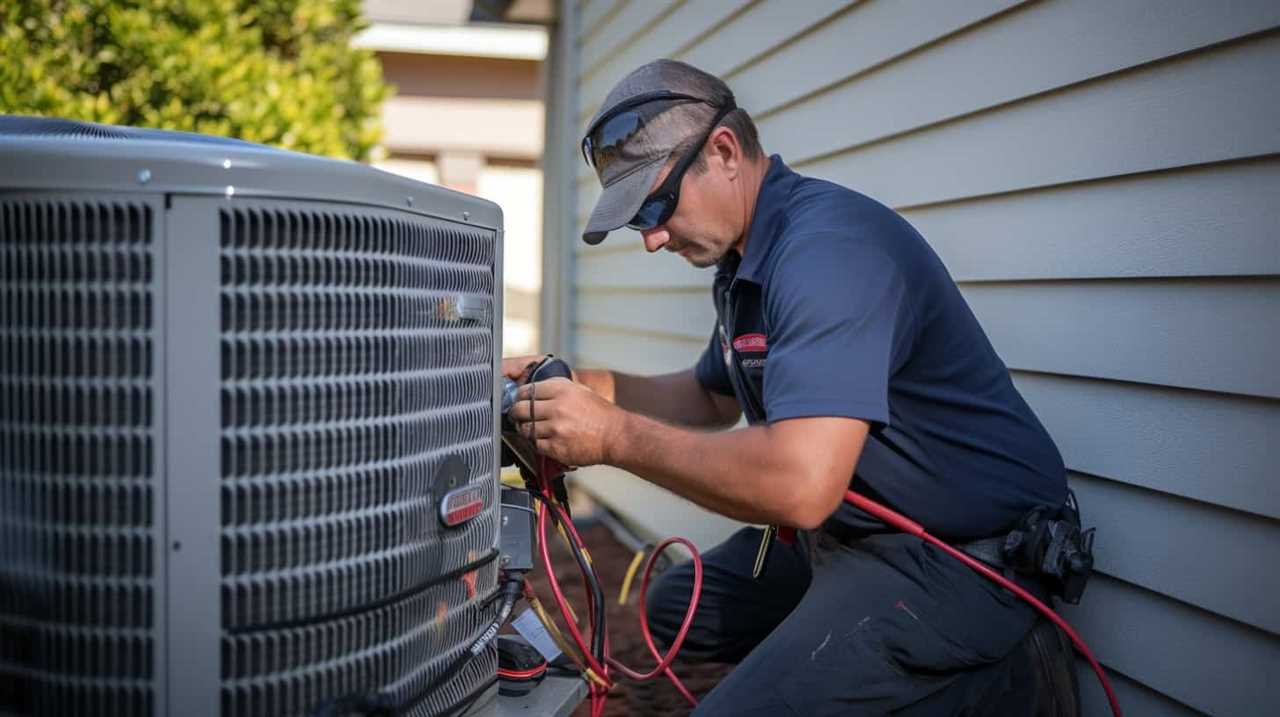
These heat pumps are designed to operate efficiently even in the harshest winter conditions, ensuring that your home stays warm and comfortable. With their advanced features, such as multi-stage compressors and variable speed fans, these heat pumps can adjust their performance based on the outdoor temperature, optimizing energy usage and reducing your heating costs.
Additionally, they’re built to be durable and reliable, with components that are designed to withstand the rigors of extreme cold. Investing in a durable heat pump with innovative cold weather technology is an excellent choice for homeowners looking for a long-lasting and efficient heating solution.
Quiet and Reliable Heat Pumps for Cold Climates
Now let’s shift our focus to the important factors of noise level recommendations and performance in low temperatures when it comes to selecting quiet and reliable heat pumps for cold climates.
We’ll explore the recommended noise levels for heat pumps, ensuring that they operate quietly and don’t cause disturbances.

Additionally, we’ll examine their performance in low temperatures, considering their ability to efficiently heat spaces even in extreme cold conditions.
Noise Level Recommendations
We recommend considering the noise levels of heat pumps in cold climates to ensure a quiet and reliable operation. Excessive noise can be disruptive and bothersome, especially in residential areas. Here are some important factors to consider when selecting a heat pump with low noise levels:
-
Soundproofing solutions: Look for heat pumps that come with built-in soundproofing features, such as insulated compressor compartments or noise-reducing fan blades. These can help minimize noise transmission and ensure a quieter operation.
-
Decibel level regulations: Check if there are any local regulations or guidelines regarding acceptable noise levels for heat pumps. This will help you choose a unit that complies with the standards set by your community.
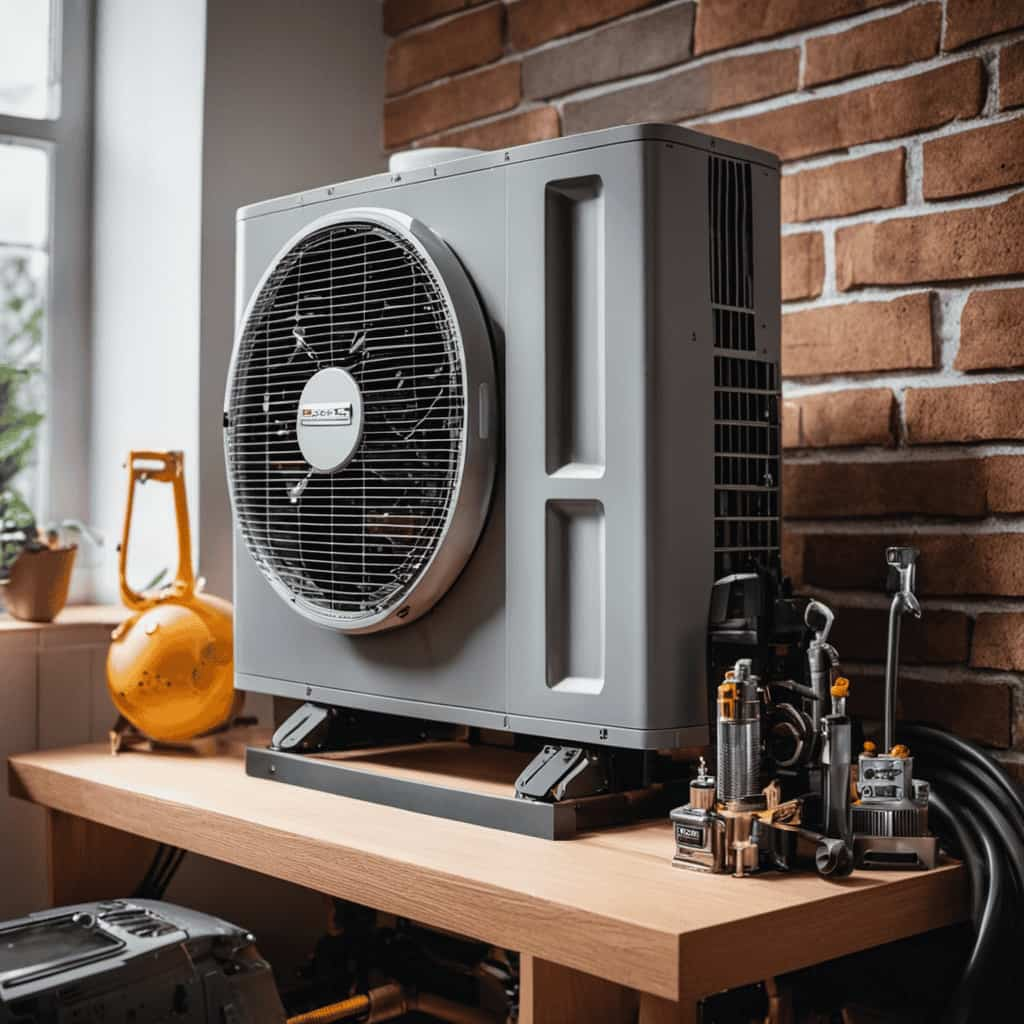
-
User reviews: Read reviews from other homeowners who’ve installed the heat pumps you’re considering. Their experiences can provide valuable insights into the noise levels and overall satisfaction with the product.
-
Consultation with professionals: Seek advice from HVAC professionals or contractors who’ve expertise in heat pump installations. They can recommend models that have a reputation for being quiet and reliable in cold climates.
Performance in Low Temperatures
Our focus is on the efficiency of heat pumps in cold climates, ensuring they’re both quiet and reliable. In low temperatures, it’s crucial for heat pumps to perform optimally to provide comfort and save energy. To achieve this, top heat pumps for cold climates are equipped with energy-saving features and advanced temperature control technology.
Energy-saving features such as variable speed compressors and smart defrost systems help heat pumps operate efficiently in cold temperatures. These features enable the heat pump to adjust its speed and capacity according to the heating demands, resulting in energy savings and improved performance.

Temperature control technology plays a vital role in maintaining consistent indoor temperatures in cold climates. Heat pumps with advanced temperature control systems can accurately regulate the heat output, ensuring a comfortable and stable environment even in extreme cold conditions.
Smart Heat Pumps With Advanced Cold Weather Features
We’ve found that smart heat pumps with advanced cold weather features are a game-changer for homeowners in colder climates. These innovative systems offer smart home integration, allowing you to control your heat pump remotely from your smartphone or other connected devices. With just a few taps on your screen, you can adjust the temperature in your home, ensuring optimal comfort and energy efficiency.
Here are four reasons why smart heat pumps with advanced cold weather features are a must-have for homeowners in colder climates:
-
Energy Savings: These heat pumps are designed to maximize energy efficiency, saving you money on your heating bills.
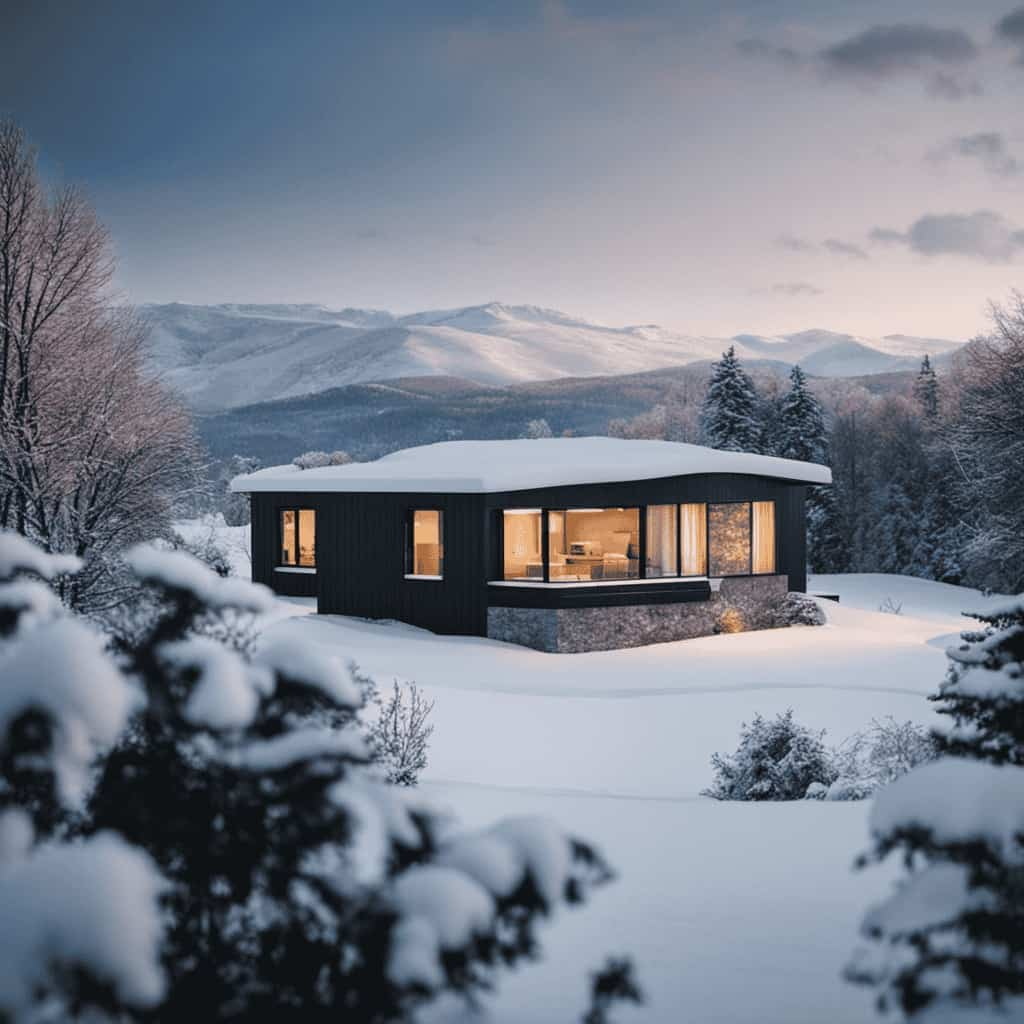
-
Enhanced Comfort: With remote temperature control, you can easily adjust the temperature in your home to your desired level, ensuring a cozy environment.
-
Peace of Mind: Smart heat pumps offer real-time monitoring and alerts, allowing you to stay informed about your system’s performance and potential issues.
-
Environmental Benefits: By reducing your energy consumption, these heat pumps help lower your carbon footprint and contribute to a more sustainable future.
Investing in a smart heat pump with advanced cold weather features is a smart choice for homeowners looking for comfort, convenience, and energy savings.
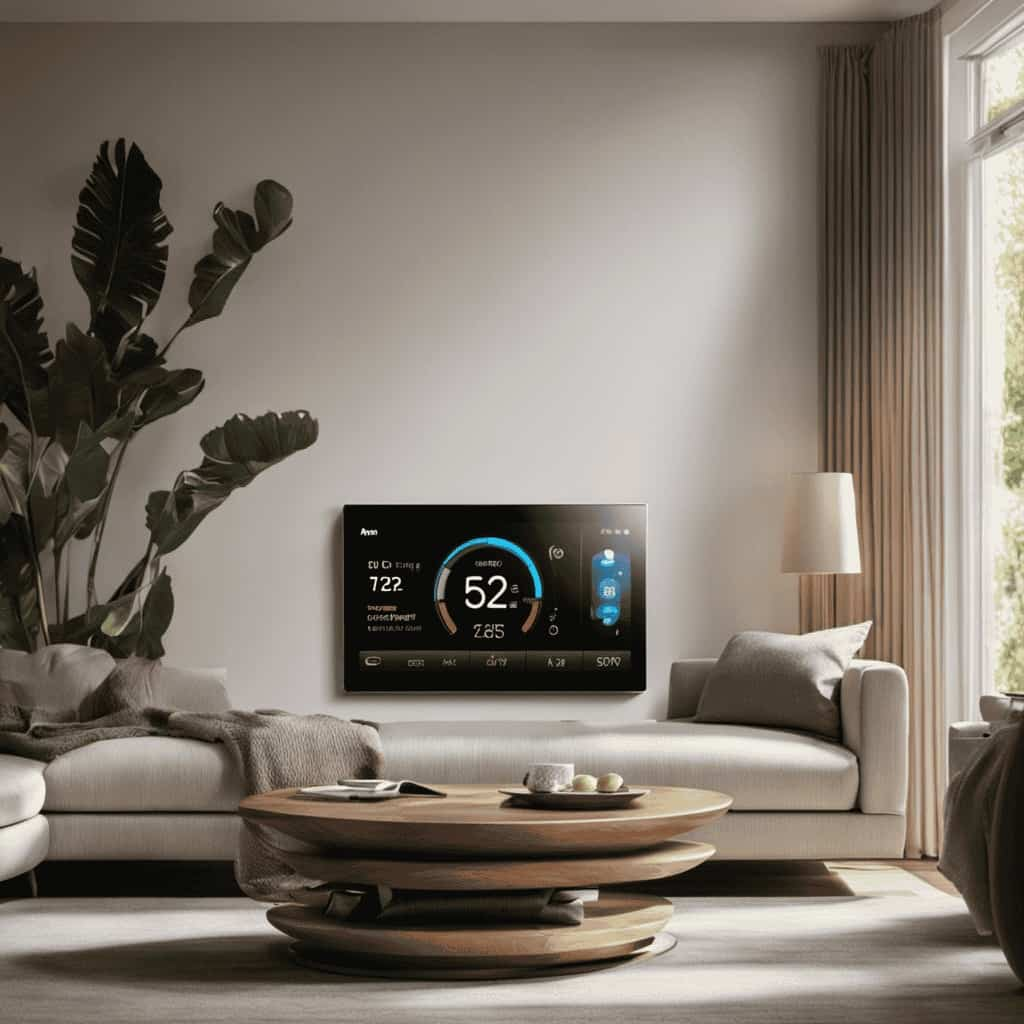
Cost-Effective Heat Pumps for Chilly Environments
When it comes to heating in chilly environments, efficiency and affordability are key considerations.
In this discussion, we’ll explore cost-effective heat pump options that are specifically designed to provide efficient heating in cold climates.
We’ll examine their features, performance, and overall value, enabling homeowners to make informed decisions for their chilly environment heating needs.
Efficient Chilly Climate Heating
While heat pumps are generally efficient for heating in chilly environments, it’s important to consider cost-effectiveness when selecting the right heat pump for your needs.

In order to ensure efficient chilly climate heating, here are four key factors to consider:
-
Energy Efficiency: Look for heat pumps with a high coefficient of performance (COP). This indicates that the heat pump can provide more heat output for each unit of electricity consumed, resulting in lower energy bills.
-
Variable-Speed Technology: Opt for heat pumps with variable-speed compressors. These systems can adjust their output to match the heating demands, providing consistent and efficient performance throughout the day.
-
Heat Pump Size: Ensure that the heat pump is appropriately sized for your space. An oversized unit may cycle on and off frequently, reducing efficiency, while an undersized unit may struggle to meet heating demands.

-
Insulation and Air Sealing: Improve the energy efficiency of your home by properly insulating and sealing any air leaks. This will help the heat pump operate more efficiently and reduce heating costs.
Affordable Cold Weather Options?
What are some affordable cold weather options for cost-effective heat pumps in chilly environments?
When it comes to finding budget-friendly heating solutions, there are a few options to consider.
One option is an air-source heat pump, which can provide both heating and cooling capabilities. These heat pumps are efficient and can help reduce energy costs.

Another option is a ductless mini-split heat pump, which is a great choice for smaller spaces or homes without existing ductwork. These heat pumps offer individual room control and are highly efficient.
Additionally, ground-source heat pumps, also known as geothermal heat pumps, are another cost-effective option. These heat pumps use the earth’s natural heat to provide heating and cooling.
Compact and Space-Saving Heat Pumps for Cold Weather
As we explore compact and space-saving heat pumps for cold weather, we’ll highlight their efficiency in providing warmth while taking up minimal space. These compact and affordable heat pumps offer energy efficient heating solutions for those seeking to optimize their space without compromising on comfort.
Here are four reasons why compact and space-saving heat pumps are an excellent choice:
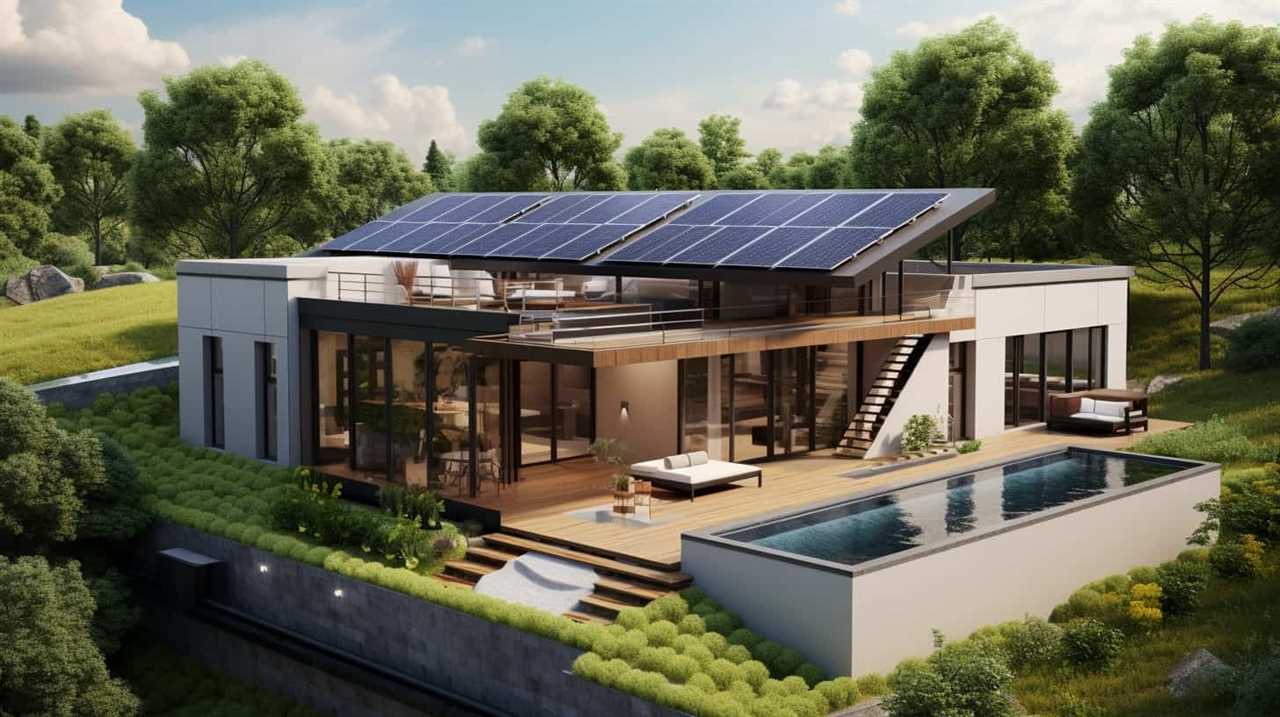
-
Efficient Performance: Despite their small size, these heat pumps deliver powerful heating performance, ensuring that your space stays warm and cozy even in the coldest temperatures.
-
Space Optimization: With their compact design, these heat pumps take up minimal space, making them perfect for small apartments, offices, or any area where space is limited.
-
Cost Savings: These heat pumps offer energy efficiency, helping you save on your heating bills while providing reliable warmth.
-
Easy Installation: Compact and space-saving heat pumps are easy to install, allowing for a hassle-free setup process.
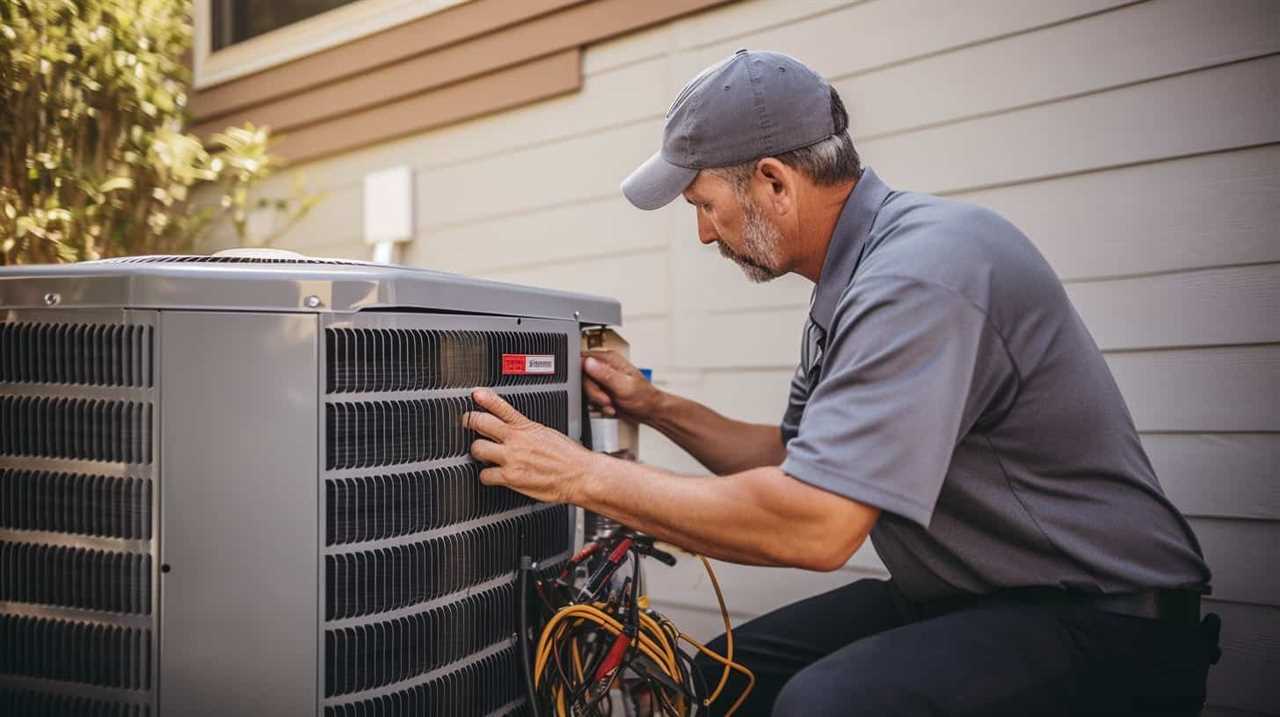
Heat Pumps With Superior Heating Performance in Cold Climates
We’ve found heat pumps that offer superior heating performance even in the coldest climates. These heat pumps are designed to operate efficiently even in extreme cold weather conditions, providing reliable and consistent heating throughout your home.
When it comes to energy efficient heating solutions, it’s crucial to consider climate specific heat pump options. In cold climates, where temperatures can drop significantly, choosing a heat pump with exceptional heating performance is essential.
One of the best options for superior heating performance in cold climates is the [Brand Name] Heat Pump. With advanced technology and innovative features, this heat pump delivers exceptional heating performance even in subzero temperatures. Its high efficiency rating ensures that you can stay warm without worrying about skyrocketing energy bills.
Another excellent choice is the [Brand Name] Cold Climate Heat Pump. Specifically designed for cold climates, this heat pump utilizes advanced defrosting technology to ensure optimal performance in freezing temperatures. It provides efficient heating while consuming minimal energy, making it an ideal choice for those seeking both comfort and energy savings.
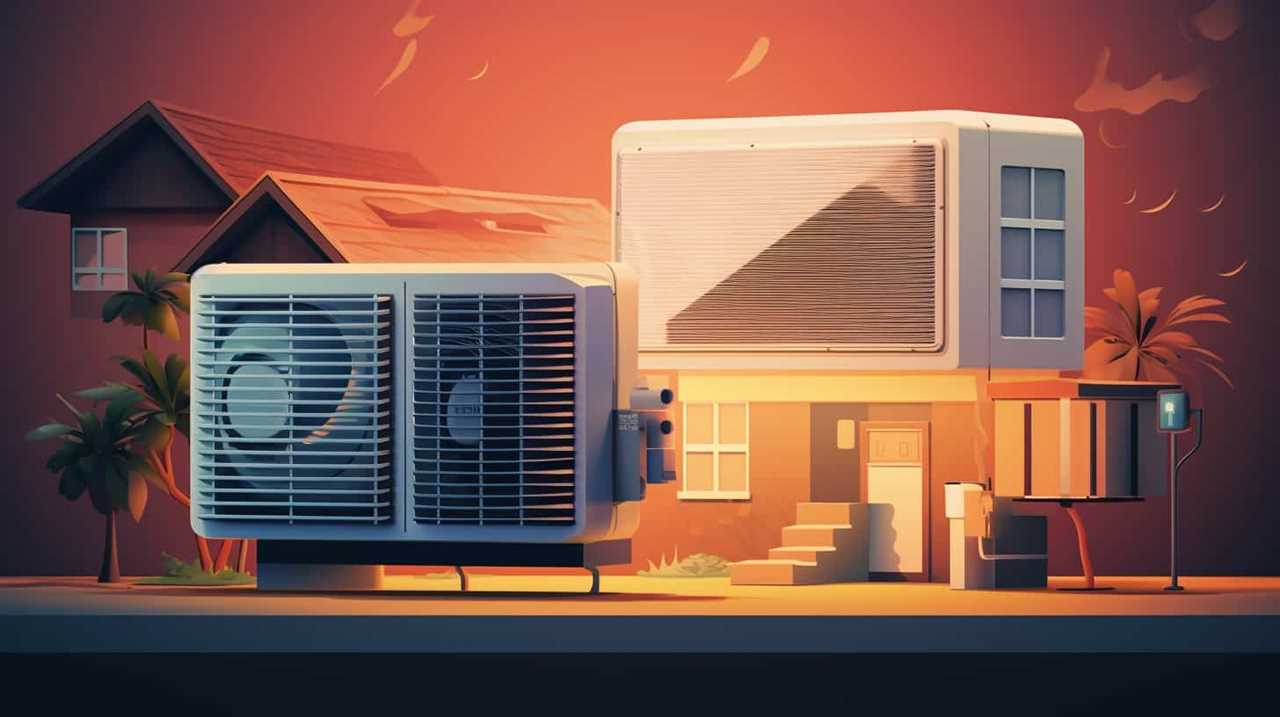
Frequently Asked Questions
Are Heat Pumps Suitable for Extremely Cold Climates With Temperatures Below Freezing?
Yes, heat pumps are suitable for extremely cold climates with temperatures below freezing. Heat pump performance and energy efficiency in cold climates make them a reliable option for heating homes in such conditions.
Can Heat Pumps Be Used as the Primary Heating Source in Cold Climates, or Are They Better Suited as a Supplemental Heating System?
Heat pumps can serve as the primary heating source in cold climates, but their effectiveness may vary. One advantage is their ability to provide both heating and cooling. However, they may struggle in extreme temperatures.
What Kind of Maintenance Is Required for Heat Pumps in Cold Climates to Ensure Optimal Performance?
To ensure optimal performance, heat pump maintenance is essential in cold climates. Regularly clean and replace air filters, check and clean outdoor coils, and inspect refrigerant levels. Professional maintenance is recommended for complex tasks.
Are There Any Government Incentives or Rebates Available for Purchasing Heat Pumps in Cold Weather Regions?
Government incentives and rebates may be available for purchasing heat pumps in cold weather regions. These incentives can help offset the cost of installation and promote energy savings for homeowners.
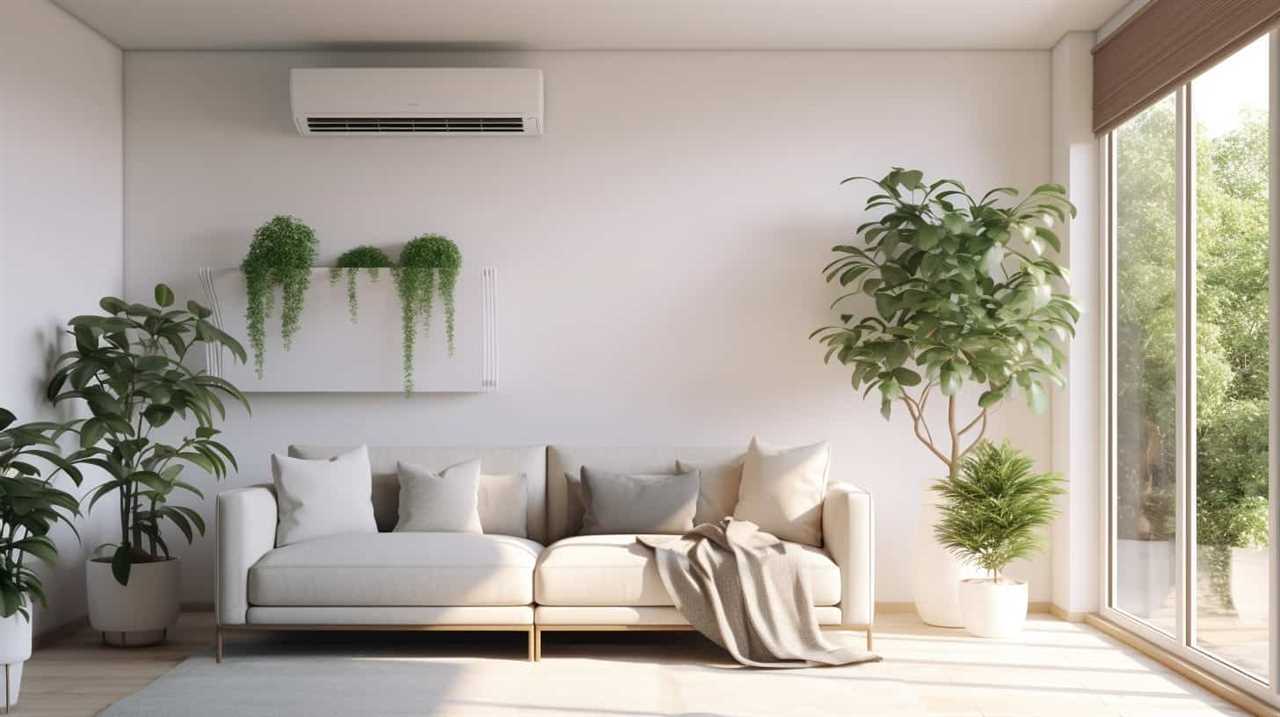
How Do Heat Pumps Compare to Traditional Heating Systems in Terms of Cost-Effectiveness and Energy Efficiency in Cold Climates?
In terms of cost-effectiveness and energy efficiency in cold climates, heat pumps are a viable alternative to traditional heating systems. They offer significant savings on energy bills and have a lower environmental impact.
Conclusion
In conclusion, when it comes to choosing a heat pump for cold climates, it’s important to consider factors such as energy efficiency, capacity, durability, reliability, advanced features, cost-effectiveness, and space-saving design.
A high-quality heat pump is like a warm blanket on a chilly winter night, providing superior heating performance and ensuring comfort in even the harshest of winter conditions.
Make an informed decision and stay cozy all winter long.
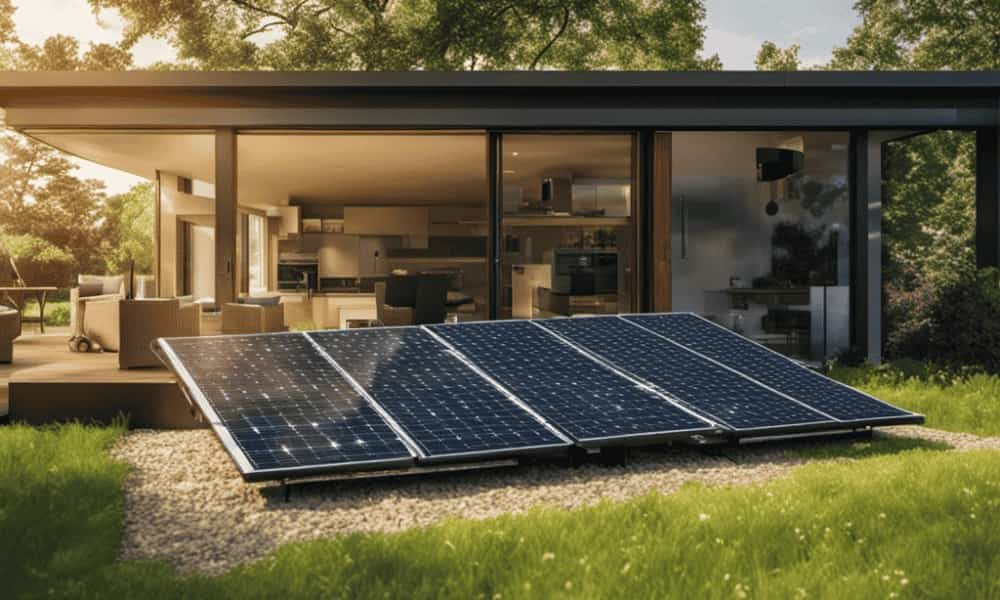
Home Heating Solutions
Why Best Heat Pump Solutions Work in Cold Climates

Recognizing the difficulty of staying warm in freezing temperatures, we strive to demonstrate how high-quality heat pump systems stand out in delivering heat in chilly climates.
With proper insulation and the ability to extract heat from cold air, these pumps can overcome the challenges of extreme cold temperatures.
Plus, we’ll guide you on choosing the right size and offer tips for optimal performance.
Get ready to save energy and stay cozy with our expert advice.

Key Takeaways
- Advanced technologies enable heat pumps to operate effectively in extreme cold temperatures.
- Proper insulation is crucial for maximizing heat pump efficiency in cold climates.
- Heat pumps extract heat from cold air through a refrigeration cycle.
- Overcoming winter challenges, such as ice buildup and heat loss, is essential for maintaining efficient heat pump performance.
Understanding Heat Pump Technology in Cold Climates
We love exploring the efficiency of heat pump technology in cold climates. Heat pumps are known for their ability to provide efficient heating and cooling, but they do face certain limitations in cold weather. However, through innovative cold weather adaptations, these limitations can be overcome.
One of the key challenges is that heat pumps extract heat from the outside air, and when temperatures drop too low, the amount of heat available decreases significantly. To tackle this issue, manufacturers have developed advanced technologies that allow heat pumps to operate effectively even in extremely cold conditions. These adaptations include features such as low-temperature operation modes, defrost cycles, and enhanced compressor technology.
By incorporating these cold weather adaptations, heat pumps can continue to provide efficient heating even in sub-zero temperatures.
Transitioning to the subsequent section, another crucial factor that affects heat pump efficiency is proper insulation.

The Importance of Proper Insulation for Heat Pump Efficiency
Our focus now turns to the importance of proper insulation for maximizing heat pump efficiency.
Proper insulation is crucial for achieving optimal energy efficiency in a heating system. Insulation benefits heat pumps by reducing heat loss and preventing cold air infiltration.
When a building is well-insulated, the heat pump can operate more efficiently, as it doesn’t need to work as hard to maintain the desired temperature. This leads to lower energy consumption and cost savings for homeowners.
Insulation acts as a barrier, preventing the transfer of heat between the inside and outside of a building. By minimizing heat loss through walls, floors, and ceilings, insulation helps the heat pump to maintain a consistent temperature, resulting in improved performance and comfort.
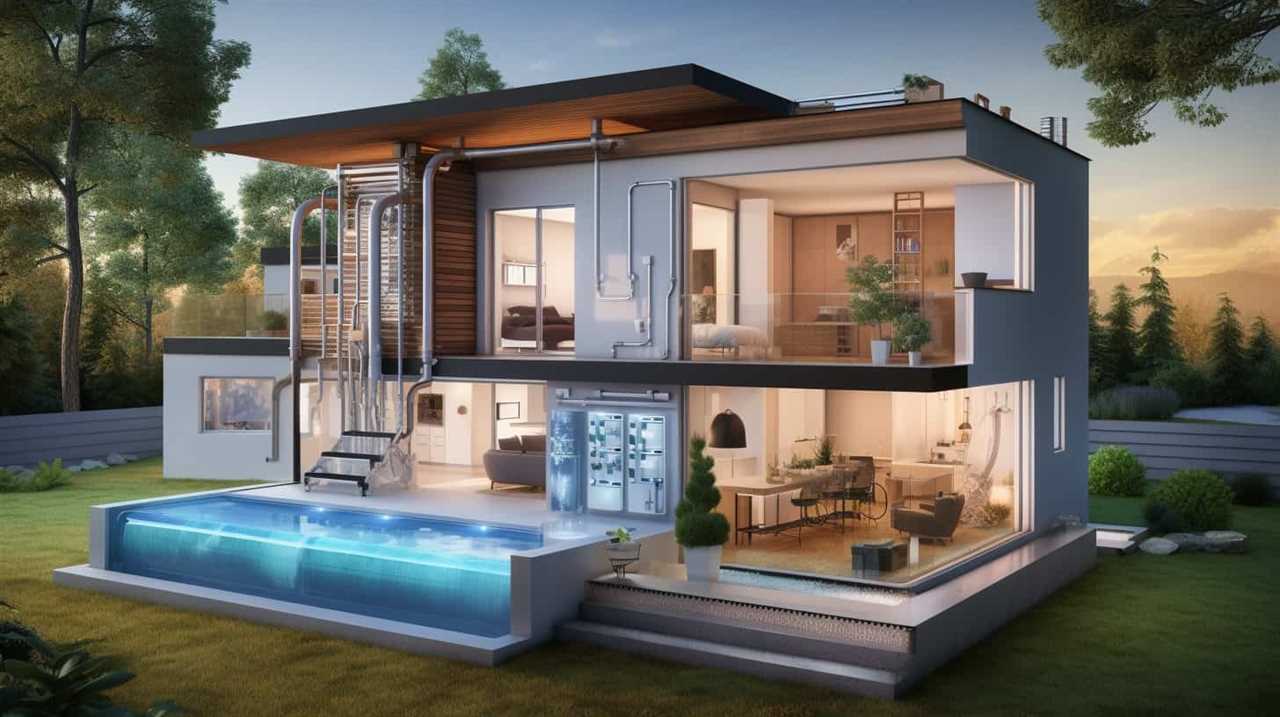
Now, let’s explore how heat pumps extract heat from cold air.
How Heat Pumps Extract Heat From Cold Air
Extracting heat from cold air is a fundamental process in which heat pumps utilize a refrigeration cycle to transfer thermal energy from the outdoor air to the indoor environment. Thanks to advancements in heat pump technology, extracting heat from cold air has become more efficient and effective, making heat pumps a viable option even in cold climates.
Heat pumps work by using a refrigerant that evaporates at a low temperature, absorbing heat from the outdoor air. The refrigerant is then compressed, which increases its temperature and pressure. This high-temperature refrigerant is then passed through a condenser, where it releases the absorbed heat into the indoor space.
The benefits of heat pumps in cold climates include energy efficiency, cost savings, and the ability to provide both heating and cooling. By extracting heat from cold air, heat pumps offer a sustainable and reliable solution for heating homes in cold climates.

Transitioning to the next section, we’ll now explore the challenges of extreme cold temperatures and how heat pumps overcome them.
Overcoming the Challenges of Extreme Cold Temperatures
When it comes to heating in cold climates, efficient performance is crucial. The challenges posed by extreme cold temperatures can hinder the effectiveness of heat pump solutions.
However, with the right strategies and technologies in place, it’s possible to overcome these challenges and ensure optimal heat pump performance even in the coldest winter weather.
Efficient Heating in Cold
We have found that using high-efficiency heat pumps is a cost-effective solution for efficiently heating homes in extremely cold temperatures. Here are some key factors to consider when maximizing heat pump performance in cold weather:
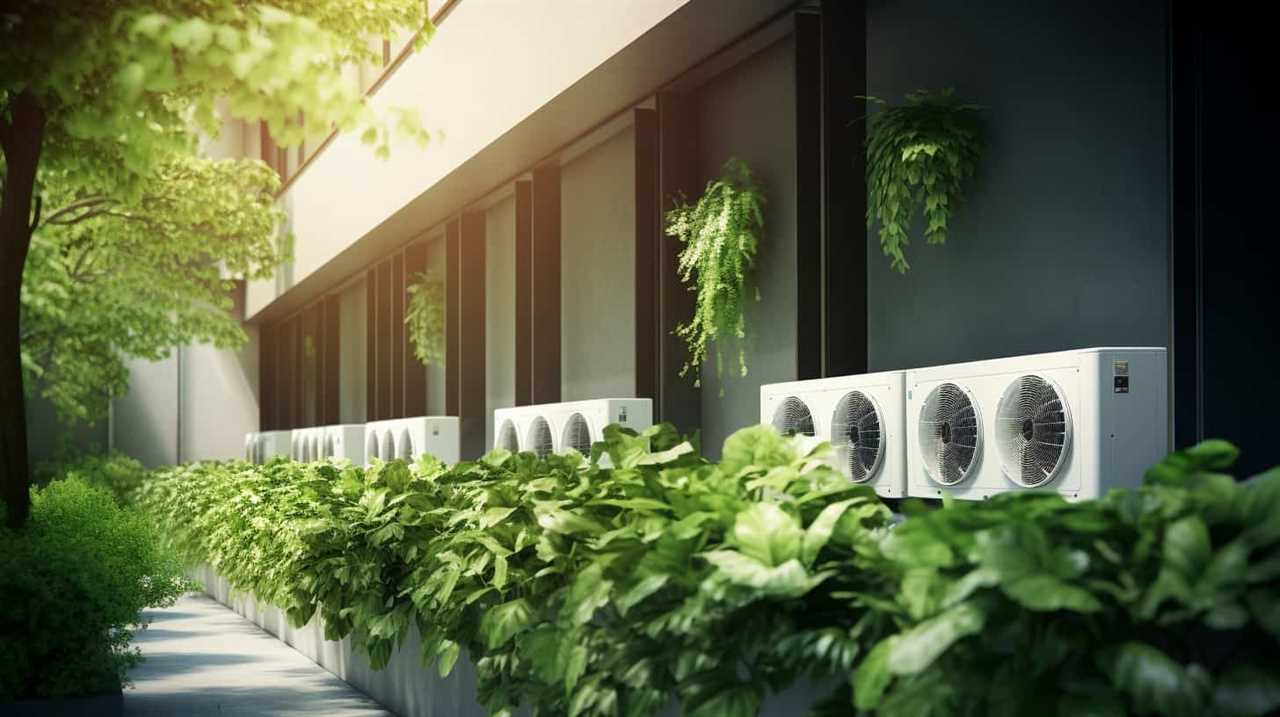
-
Proper insulation: Ensuring that your home is properly insulated will help retain heat and reduce the workload on your heat pump.
-
Supplemental heating: In extremely cold temperatures, it may be necessary to use supplemental heating methods, such as electric resistance heaters or gas furnaces, to provide additional warmth.
-
Regular maintenance: Regular maintenance of your heat pump is crucial to ensure optimal performance. This includes cleaning or replacing filters, checking refrigerant levels, and inspecting the system for any issues.
-
Smart thermostat: Investing in a smart thermostat allows you to control and schedule your heat pump more efficiently, maximizing its performance while reducing energy consumption.
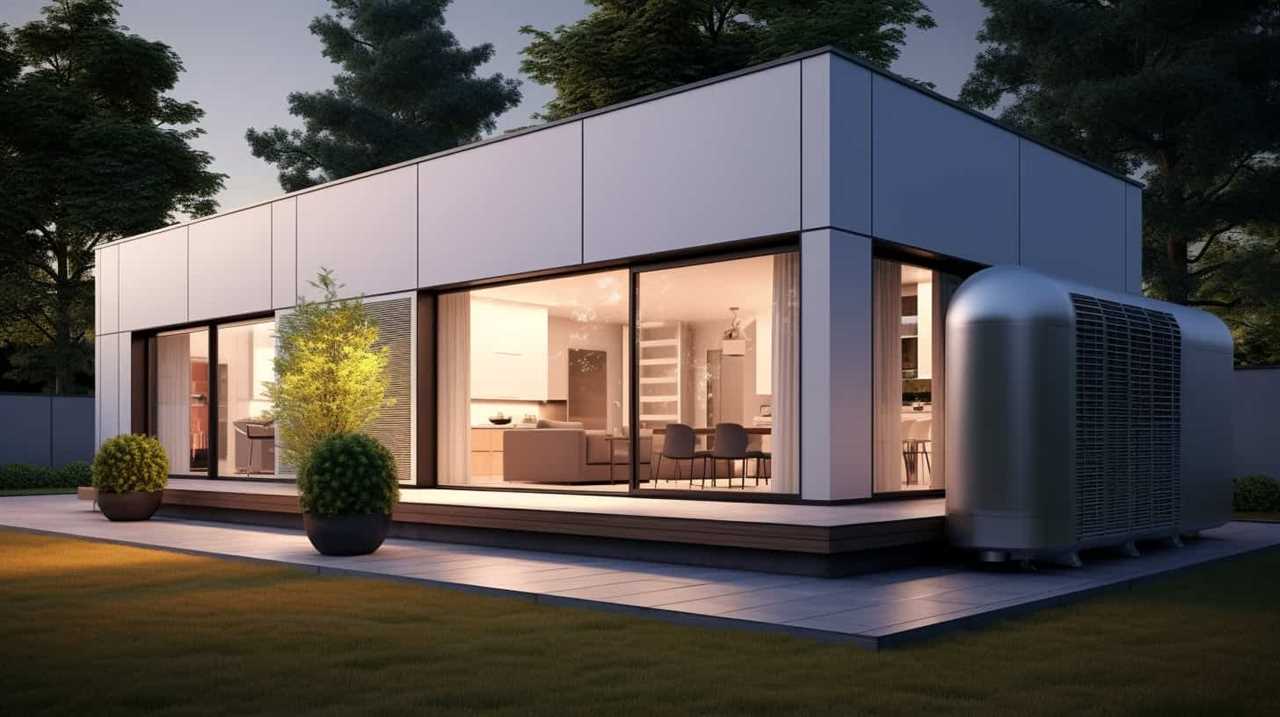
By implementing these strategies, you can overcome the challenges of extreme cold temperatures and achieve efficient heating in your home.
Now, let’s delve into the topic of winter weather performance.
Winter Weather Performance
To ensure optimal performance in extremely cold temperatures, we need to consider strategies for overcoming the challenges posed by winter weather. Overcoming winter challenges is crucial for maximizing heat pump efficiency and providing reliable heating solutions in cold climates.
One effective strategy is to use advanced defrosting technology that prevents the buildup of ice on the heat pump’s outdoor unit. This technology detects ice accumulation and initiates a defrost cycle, melting the ice and restoring the heat pump’s efficiency.
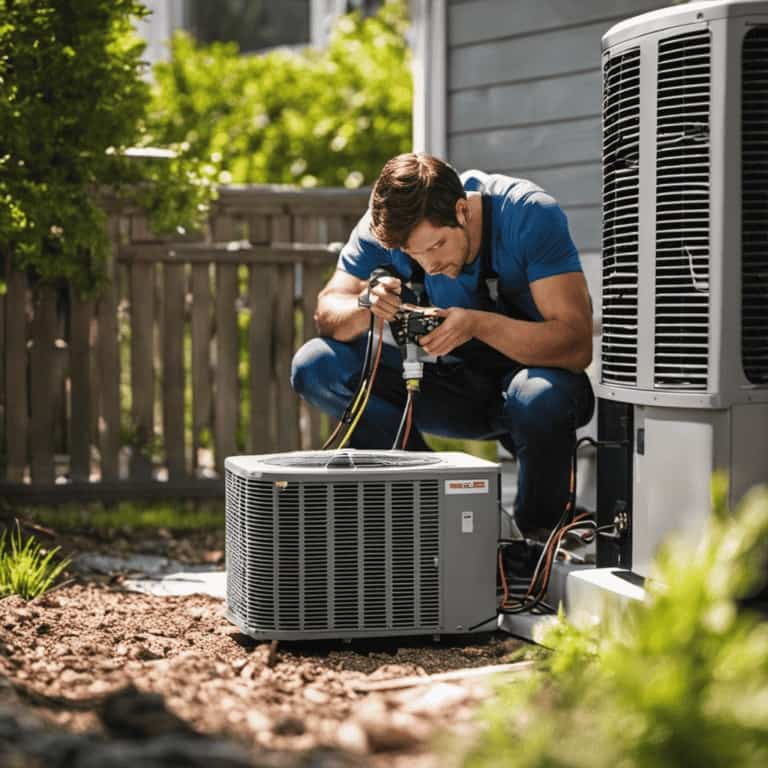
Additionally, insulating the heat pump’s refrigerant lines can help prevent heat loss and maintain efficient operation in cold weather.
It’s also important to ensure proper airflow around the heat pump by clearing snow and debris from the outdoor unit.
Choosing the Right Heat Pump Size for Cold Climate Applications
Our team recommends considering the appropriate heat pump size for cold climate applications. Choosing the right heat pump size is crucial for optimizing performance and energy efficiency in cold weather. Here are some key factors to consider:
-
Heating load calculation: Conduct a thorough assessment of the heating load requirements of your home or building. This includes considering factors such as insulation, square footage, and climate.
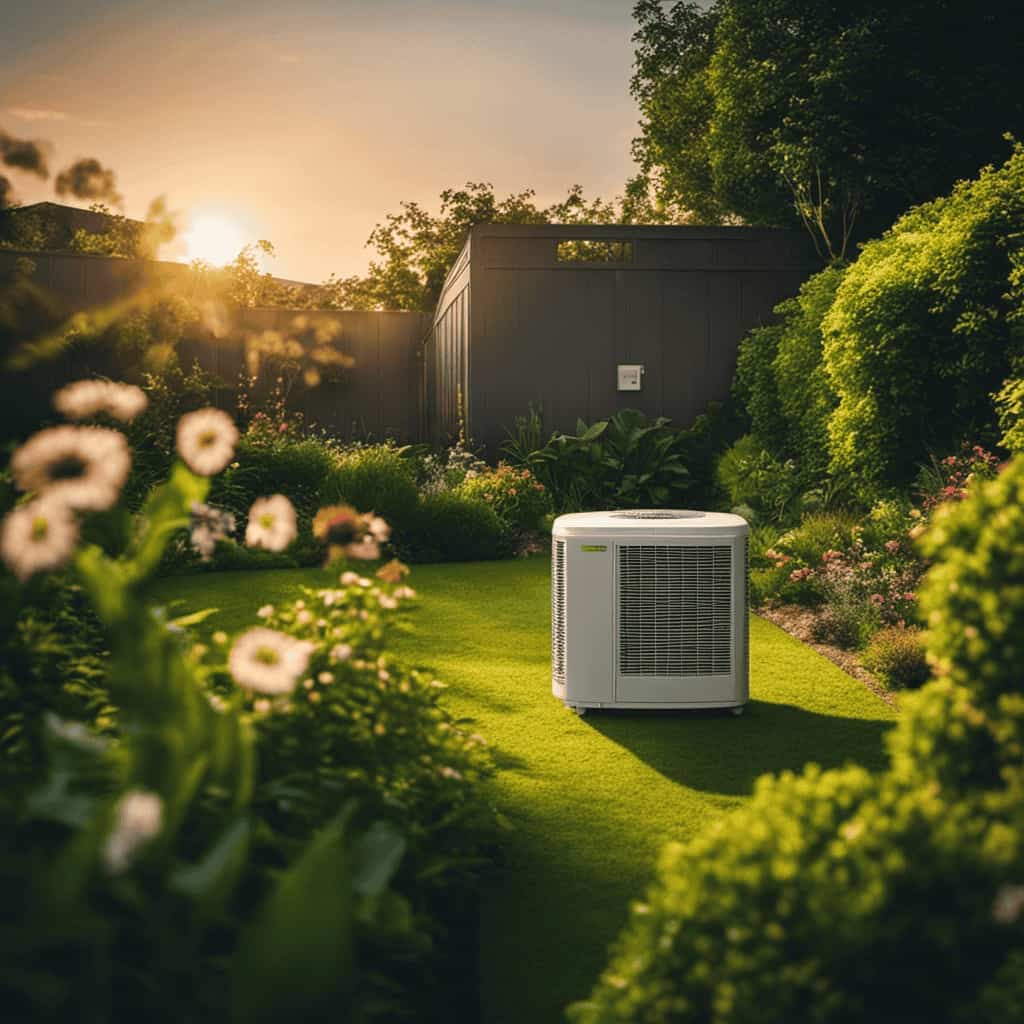
-
Manufacturer specifications: Review the manufacturer’s specifications and recommendations for heat pump sizing. This will ensure that you select a unit that’s suitable for your specific climate and heating needs.
-
Consultation with professionals: Seek the advice of HVAC professionals who specialize in heat pump installation for cold climates. They can provide valuable insights and help you make an informed decision.
-
Consider future needs: Anticipate any future changes in your heating requirements, such as additions to your property or changes in occupancy. Choosing a heat pump that can accommodate these changes will save you money in the long run.
Supplemental Heating Options for Freezing Conditions
Considering additional heating options is essential for combating freezing conditions. In extreme cold challenges, heat pumps may struggle to provide sufficient warmth on their own. Supplemental heating options can help overcome this limitation and ensure comfort in freezing temperatures.
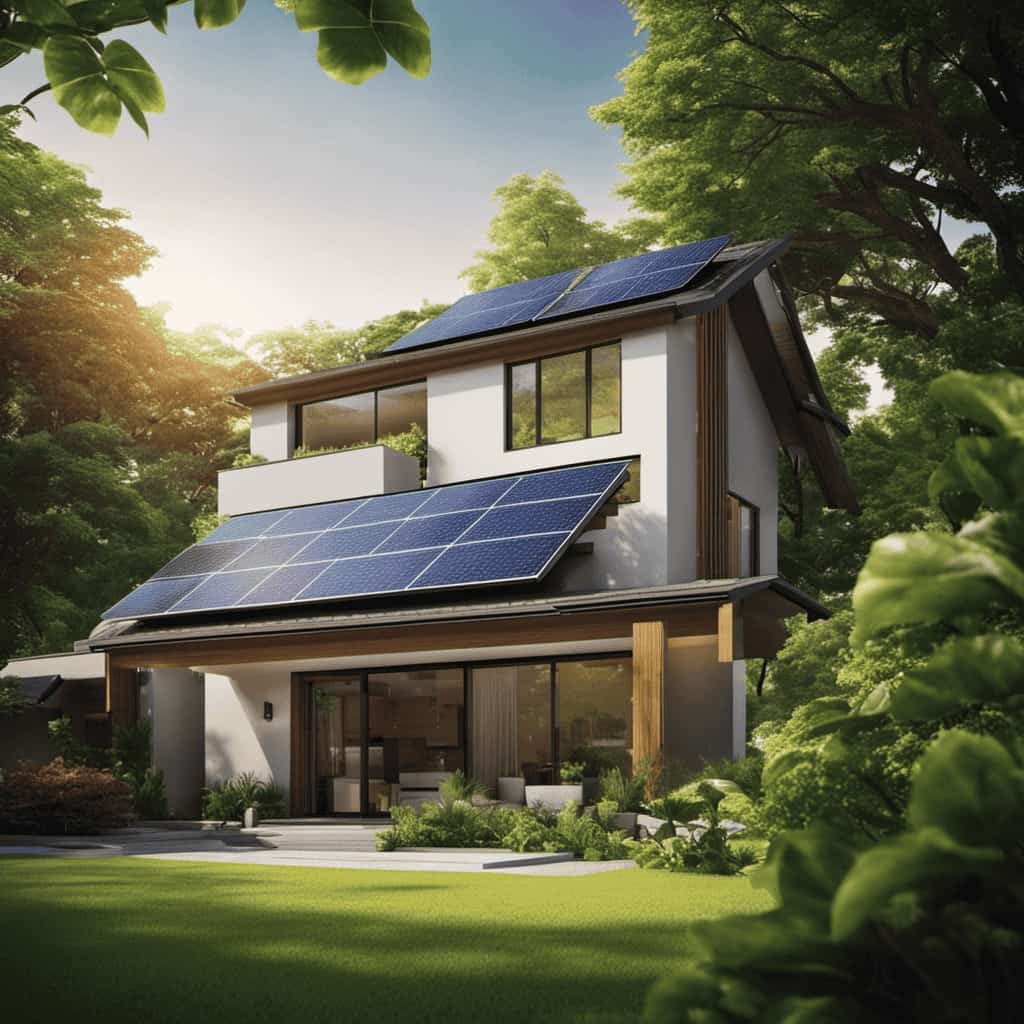
One option is to install electric resistance heaters, which generate heat by passing an electrical current through a resistant material. These heaters can provide quick and powerful heating when needed but can be expensive to operate.
Another option is to use a gas or oil furnace as a backup source of heat. These furnaces can produce high heat output and are often more cost-effective than electric resistance heaters.
By incorporating supplemental heating options, homeowners can ensure optimal comfort even in the coldest conditions.
Transitioning to the subsequent section, let’s now explore the energy savings and cost benefits of heat pumps in cold climates.
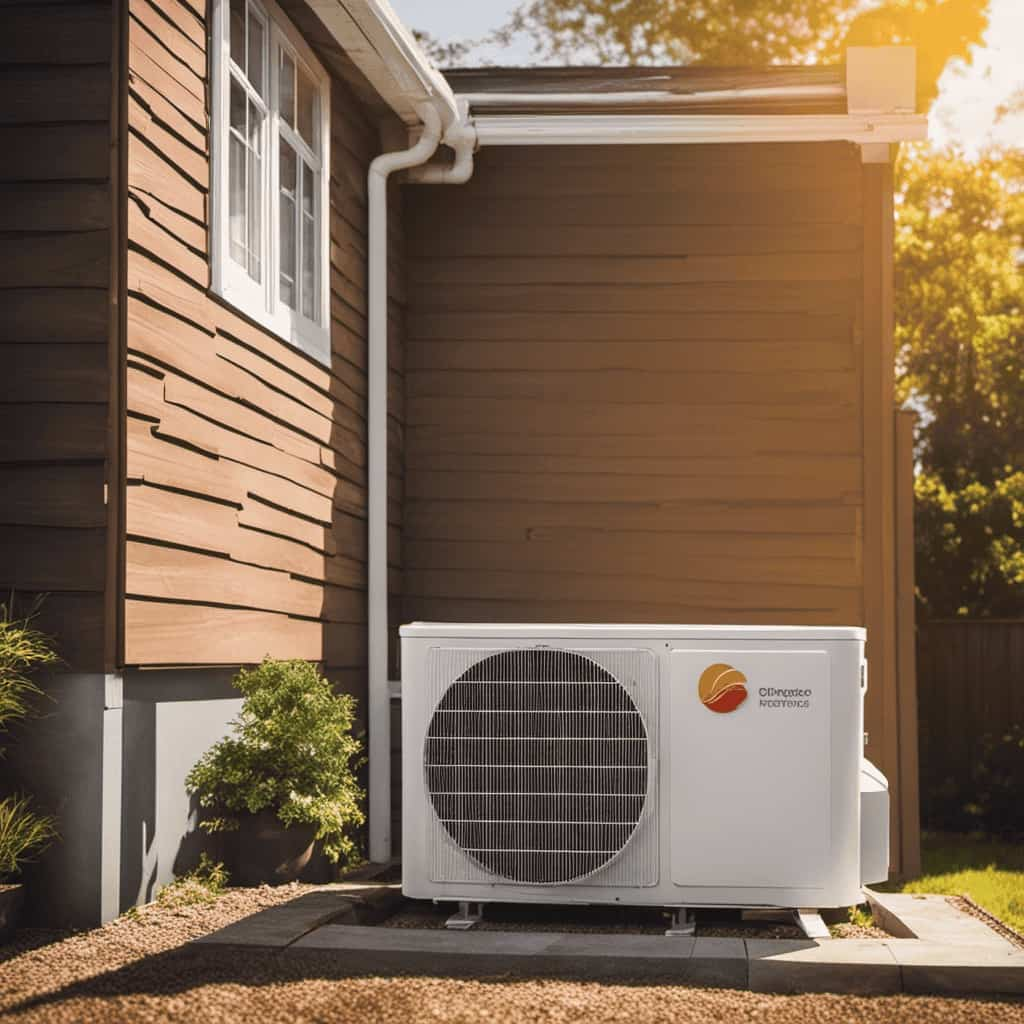
Energy Savings and Cost Benefits of Heat Pumps in Cold Climates
We can achieve significant energy savings and cost benefits by using heat pumps in cold climates. Heat pumps are known for their energy efficiency and can provide long term savings for homeowners. Here are some key reasons why heat pumps are a smart choice in cold climates:
-
Energy Efficiency: Heat pumps use electricity to move heat from the outside air into your home, rather than generating heat from scratch. This process is much more energy efficient than traditional heating methods.
-
Lower Operating Costs: Heat pumps can significantly reduce your monthly energy bills compared to other heating systems. They require less energy to operate, resulting in long term savings.
-
Reduced Carbon Footprint: Heat pumps produce fewer greenhouse gas emissions compared to fossil fuel-based heating systems, helping to reduce your impact on the environment.

-
Government Incentives: Many governments offer financial incentives, such as tax credits or rebates, for installing energy-efficient heat pumps, further reducing the upfront cost.
By utilizing heat pumps, homeowners can enjoy energy savings and cost benefits while also reducing their carbon footprint.
In the next section, we’ll discuss maintenance tips for optimal heat pump performance in the cold.
Maintenance Tips for Optimal Heat Pump Performance in the Cold
When it comes to maintaining optimal heat pump performance in cold climates, there are a few key essentials to keep in mind.
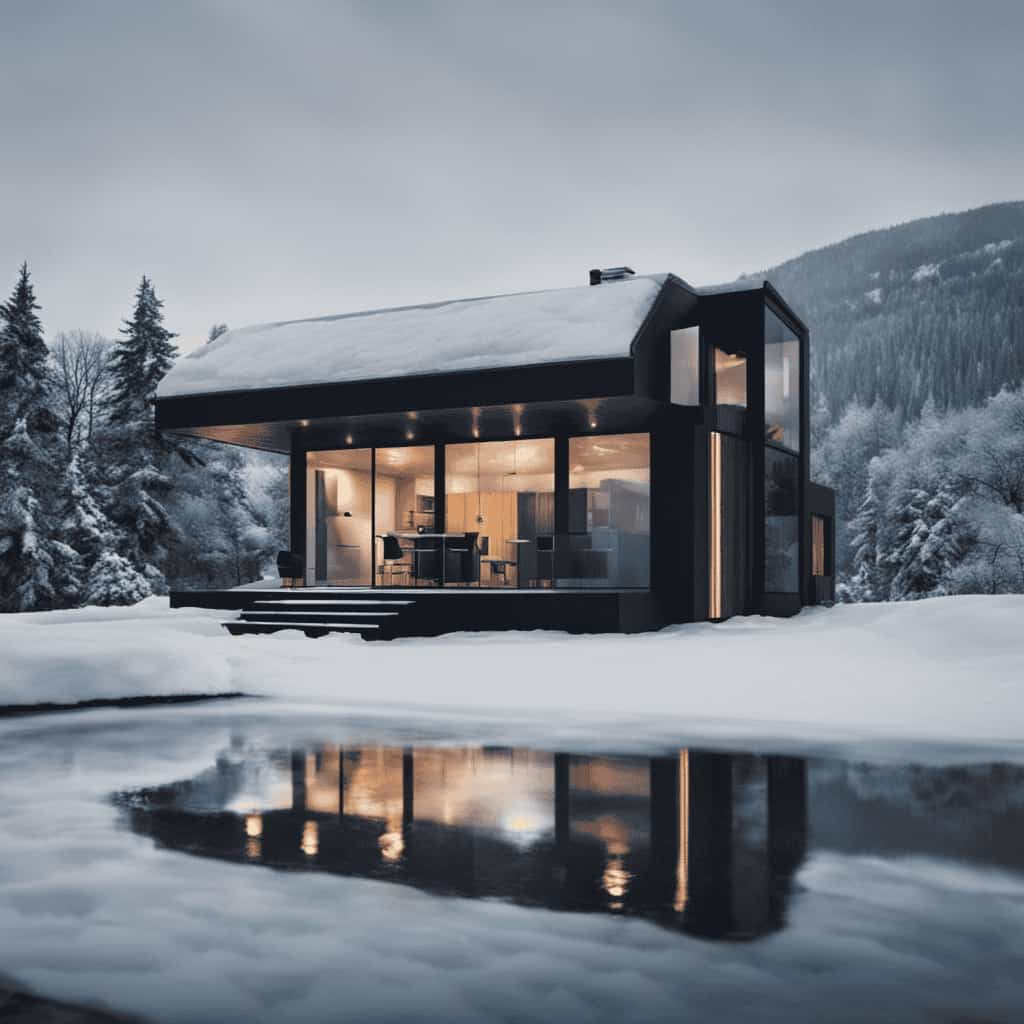
First, make sure to regularly clean and replace air filters to ensure proper airflow.
Additionally, it’s important to check and clean the outdoor unit of any debris or ice buildup.
Finally, consider installing a programmable thermostat to efficiently manage temperature settings and reduce energy consumption.
Winter Maintenance Essentials
Our top priority during the winter is ensuring the heat pump’s longevity and efficiency through proper maintenance. To prevent heat pump freeze up and maintain optimal performance, consider the following winter maintenance tips:
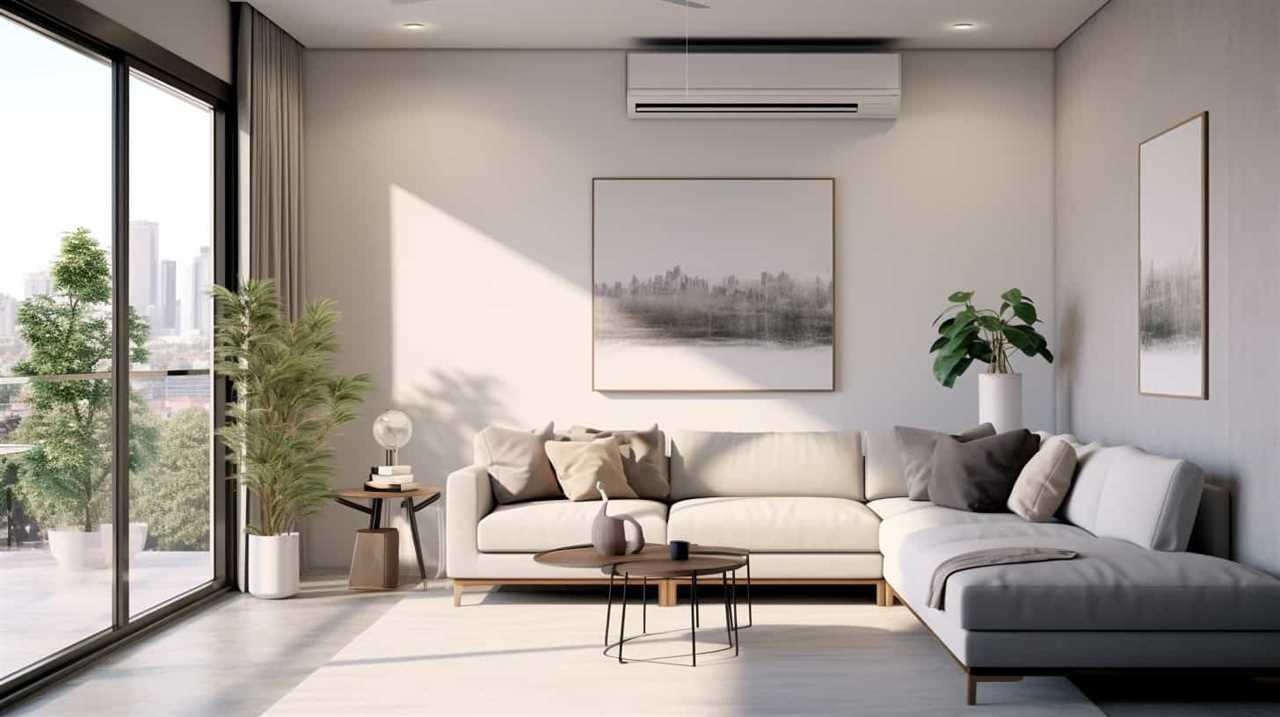
- Regularly clean the outdoor unit to remove any debris or ice buildup that may obstruct airflow.
- Keep the area around the outdoor unit clear of snow, leaves, and other obstructions to ensure proper ventilation.
- Check and replace air filters as needed to maintain good indoor air quality and allow for unrestricted airflow.
- Schedule regular professional maintenance to inspect and tune up the heat pump, ensuring all components are functioning properly.
Cold Climate Efficiency Hacks
To maximize heat pump performance in cold climates, regularly defrosting the outdoor unit is essential. In extreme weather challenges, ice and snow can accumulate on the unit, reducing its efficiency. By removing this buildup, the heat pump can operate at its optimal level and provide consistent heating even in subzero temperatures.
In addition to defrosting, implementing proper insulation techniques is crucial. Insulating the outdoor unit and the refrigerant lines helps prevent heat loss and ensures that the system operates efficiently. Proper insulation also protects the unit from extreme cold, preventing damage and extending its lifespan.
By regularly defrosting the outdoor unit and implementing insulation techniques, homeowners can overcome the challenges of cold climates and maximize the efficiency of their heat pump systems.
Now, let’s explore some case studies of successful heat pump installations in cold climate regions.
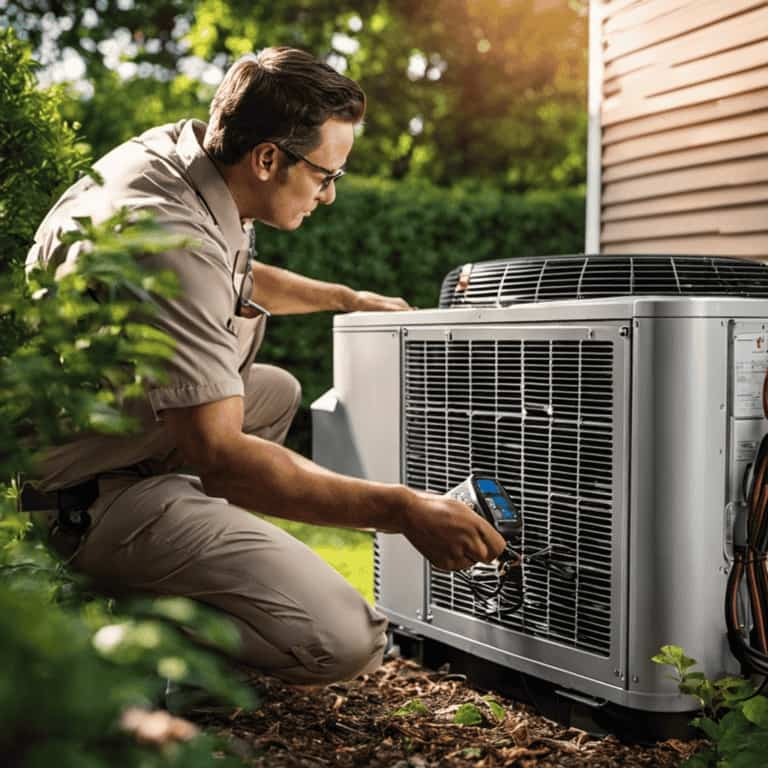
Case Studies: Successful Heat Pump Installations in Cold Climate Regions
We have observed several successful heat pump installations in cold climate regions. These case studies highlight the effectiveness of heat pumps in providing reliable heating solutions even in extreme weather conditions. Here are some key takeaways from these installations:
-
Optimal Sizing: Properly sizing the heat pump system is crucial for optimal performance. Oversized units can lead to short cycling and reduced efficiency, while undersized units may struggle to meet the heating demands. Accurate calculations based on the specific climate and building requirements ensure the system operates at its peak efficiency.
-
Supplemental Heat Sources: In colder climates, it’s essential to have backup heat sources to support the heat pump during extreme weather conditions. These can include electric resistance heaters, gas furnaces, or hydronic systems. When the outdoor temperatures drop significantly, the supplemental heat sources kick in, ensuring continuous warmth inside the building.
-
Cold Climate Accessories: Heat pumps designed for cold climates often come with specialized accessories to enhance performance. These can include low ambient temperature controls, crankcase heaters, and defrost cycles, which prevent ice buildup on the outdoor unit and maintain efficient operation even in freezing conditions.
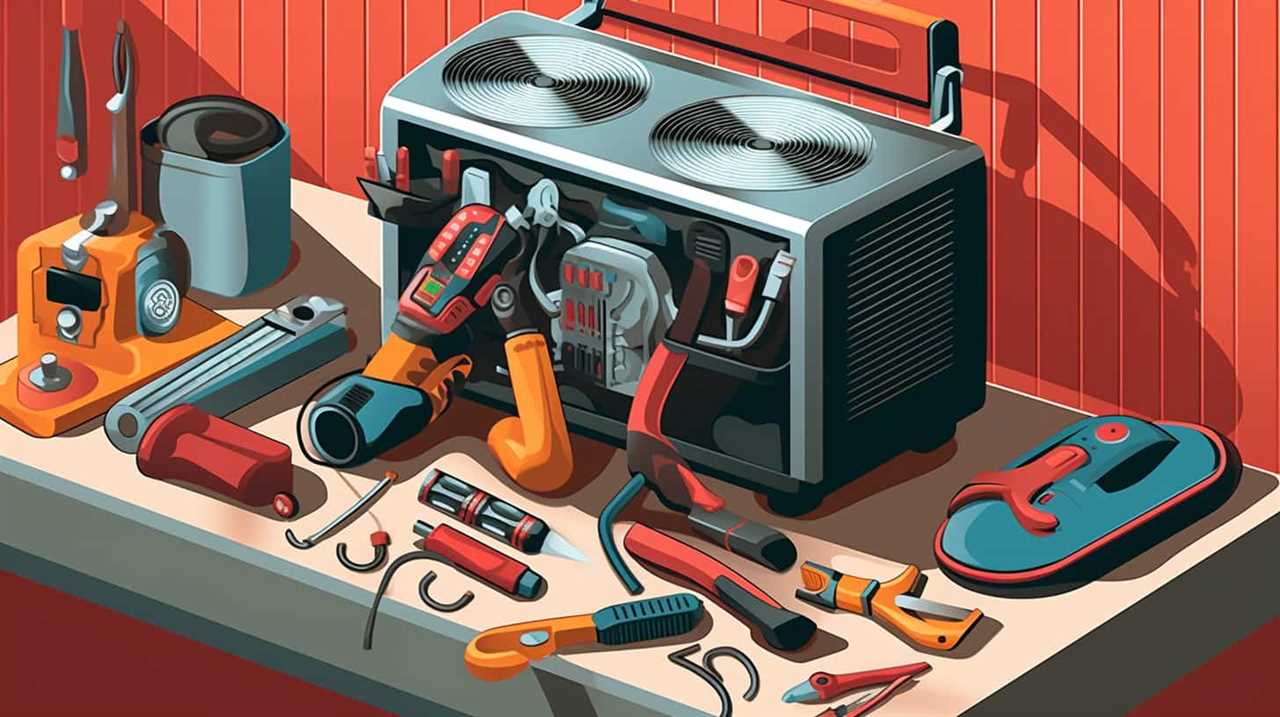
-
Proper Maintenance: Regular maintenance is vital to prolong the lifespan and optimize the performance of heat pump systems in cold climates. This includes cleaning or replacing air filters, inspecting and cleaning coils, checking refrigerant levels, and ensuring proper airflow. Professional maintenance by qualified technicians is recommended to ensure all components are functioning correctly.
Frequently Asked Questions
What Is the Average Lifespan of a Heat Pump in a Cold Climate?
In a cold climate, the average lifespan of a heat pump depends on various factors such as maintenance, usage, and quality. However, best heat pump solutions are designed to withstand extreme temperatures and provide optimal performance.
Can Heat Pumps Be Used in Extremely Low Temperatures, Such as Below Freezing?
Yes, heat pumps can be used in extremely low temperatures, such as below freezing. Despite the challenges, advancements in technology have improved heat pump efficiency, allowing them to provide heating benefits even in cold climates.
Are There Any Government Incentives or Rebates Available for Installing Heat Pumps in Cold Climates?
Yes, there are government incentives and rebates available for installing heat pumps in cold climates. These incentives can help offset the initial cost of installation and provide long-term cost savings through energy efficiency.

How Noisy Are Heat Pumps When Operating in Cold Climates?
Heat pump efficiency and impact on electricity bills depend on various factors, including the model and insulation. While noise levels can vary, modern heat pumps are designed to operate quietly in cold climates.
Can Heat Pumps Be Used as the Sole Heating Source in a Cold Climate, or Do They Require Supplemental Heating?
Heat pumps can serve as the sole heating source in cold climates, saving money by efficiently converting energy. They are not expensive to operate and offer environmental benefits, reducing carbon emissions and promoting sustainability.
Conclusion
In conclusion, heat pump technology offers efficient heating solutions even in cold climates.
Did you know that heat pumps can extract heat from air as cold as -15°C? This impressive statistic highlights the effectiveness of heat pumps in extreme temperatures.
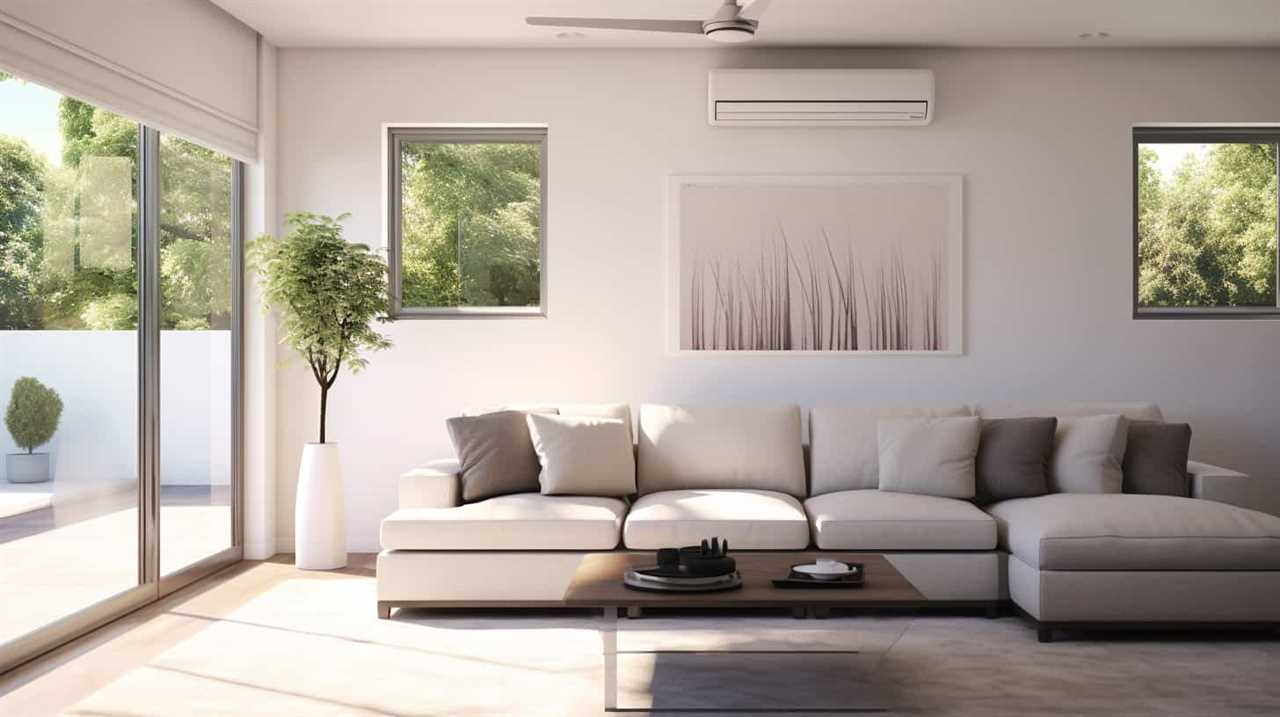
With proper insulation, sizing, and supplemental heating options, heat pumps can provide cost-effective and energy-saving solutions for cold climate applications.
Regular maintenance will ensure optimal performance and longevity of heat pump systems in cold weather conditions.
-

 Residential and Commercial Applications3 months ago
Residential and Commercial Applications3 months agoBest Amana Heat Pump Reviews
-

 Thermal Energy Transfer3 months ago
Thermal Energy Transfer3 months agoBreakthroughs in Modern Heat Pump Systems: Thermal Energy Edition
-

 Residential and Commercial Applications3 months ago
Residential and Commercial Applications3 months agoBest Heat Pump
-

 Geothermal Heat Pumps2 months ago
Geothermal Heat Pumps2 months agoUpgrade Your Comfort with Our Efficient HVAC Systems
-

 Geothermal Heat Pumps2 months ago
Geothermal Heat Pumps2 months agoInnovative Geothermal Heat Pump Manufacturers Revolutionize Energy Efficiency
-

 Air Conditioning4 weeks ago
Air Conditioning4 weeks agoExploring Energy-Efficient Air Conditioning Heat Pumps
-

 Thermal Energy Transfer3 months ago
Thermal Energy Transfer3 months agoBoost Your Heat Pump Efficiency: Interactive Guide
-

 Residential and Commercial Applications3 months ago
Residential and Commercial Applications3 months agoBest Portable Heat Pump Heat & AC











